Advancing Cardiotoxicity Research: Zeinab Mroue Highlights IMTTS Research at the Cardio-Immune Interfaces Summer School
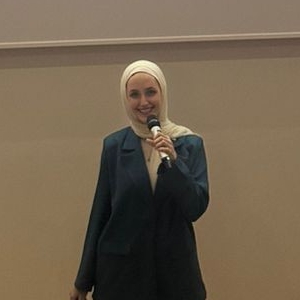
September 2025
Zeinab Mroue participated in the Cardio-Immune Interfaces Summer School held at the DZHI in Würzburg from 3–5 September 2025. As the only first-year PhD student among the ten presenters, Zeinab had the opportunity to present her PhD project on the cardiotoxicity of immune checkpoint inhibitors.
We congratulate Zeinab on her excellent representation of IMTTS and her valuable contribution to advancing research in cardiotoxicity.
RNA-Based Telomerase Therapy Shows Promise for Treating Pulmonary Fibrosis

September 2025
Pulmonary fibrosis (PF) is a severe, progressive lung disease characterized by lung tissue scarring. The median life expectancy after diagnosis is only 4-6 years. Current treatments can only slow the progression of the disease, which highlights the urgent need for innovative therapies.
In a recent study, researchers from the IMTTS explored the use of RNA-based telomerase therapy to treat PF. Since patients with PF often exhibit telomere shortening, we examined the use of human telomerase reverse transcriptase (hTERT) mRNA with modified nucleosides (modRNA) to restore telomerase activity.
Treatment with modRNA hTERT increased telomerase activity, enhanced cell proliferation, reduced DNA damage, and elongated telomeres in lung cells - all of which are key signs of cellular rejuvenation. Importantly, immune activation was minimal and transient. A circularized, exonuclease-resistant version of modRNA hTERT further increased expression, suggesting potential clinical benefits.
Finally, in three-dimensional (3D) ex vivo human lung tissue from patients with PF, a single modRNA hTERT treatment reduced cell senescence and decreased inflammatory (IL6, IL8) and fibrotic (TGFβ, COL1A1) markers.
These results demonstrate the therapeutic potential of RNA-based hTERT therapy in treating pulmonary fibrosis.
Please find the original article here:
https://doi.org/10.1111/acel.70240
Left ventricular hypertrophy and myocardial fibrosis in heart failure with preserved ejection fraction: mechanisms and treatment

September 2025
Heart failure with preserved ejection fraction (HFpEF) accounts for nearly half of all heart failure cases and is often linked to comorbidities such as hypertension, obesity, and diabetes. These conditions contribute to cardiac remodeling and myocardial fibrosis, leading to left ventricular hypertrophy, increased stiffness, and poor outcomes.
Despite recent advances, no current therapies directly target myocardial fibrosis or left ventricular hypertrophy in HFpEF. Recognizing these mechanisms as central to HFpEF pathophysiology could pave the way for new, targeted treatments.
Our recent review highlights the role of fibrotic remodeling and left ventricular hypertrophy in HFpEF. It also discusses current diagnostic approaches and emerging therapeutic strategies that aim to directly modulate myocardial fibrosis and hypertrophy to improve patient outcomes.
Please find the original article here:
https://doi.org/10.1093/eurheartj/ehaf524
Fraunhofer CIMD Symposium RNA-Based Therapeutics – News, Networking, and Awards

September 2025
The Fraunhofer CIMD recently hosted the highly anticipated Symposium on RNA-Based Therapeutics, which was expertly organized by Prof. Dr. Christian Bär. The event featured a compelling keynote address by Prof. Dr. Dr. Thomas Thum, who highlighted the latest advances in RNA research and its therapeutic potential.
Several students from IMTTS had the opportunity to participate in the second Fraunhofer CIMD Symposium on RNA-Based Therapeutics 2025. The event showcased cutting-edge research on innovative RNA manufacturing, delivery methods, and therapeutic applications, fostering insightful discussions among attendees. Elisa Mohr, a PhD student, was selected from the submitted abstracts to present her project, “Versatile Multicellular Human Cardiac Organoids as an In Vitro Platform for Modeling Cardiovascular Diseases,” in a rapid-fire presentation. Additionally, Dr. Shambhabi Chatterjee, a junior group leader, and Anita-Koula Pralas, PhD student, received awards for their outstanding poster presentations, titled “Telomerase modRNA therapy confers anti-fibrotic and anti-senescent effects against human pulmonary fibrosis” and “Therapeutic targeting of TGFß1-Responsive lncRNAs for Cardiac Fibrosis Intervention”. Congratulations!
Towards a Unified Nomenclature for Circular RNAs

September 2025
Circular RNAs (circRNAs) have gained attention as key regulators in posttranscriptional gene regulation, distinguished by their stable, closed-loop structure and diverse biological functions. However, the lack of a standardized naming system has created confusion and limited effective communication across the field.
Our new book chapter traces the evolution of circRNA research and emphasizes the urgent need for a unified nomenclature. It discusses the role of circRNA databases, the challenges posed by identifying multiple circRNAs from single gene loci, and proposes a systematic naming approach based on the “circ” prefix, GENCODE/Ensembl transcript references, and annotations for unique structural features.
Adopting a consistent nomenclature will be key to improving clarity, reproducibility, and collaboration in circRNA research moving forward.
Please find the book chapter here:
https://doi.org/10.1007/978-981-96-9428-0_2
Snow in July on Germany’s Highest Mountain
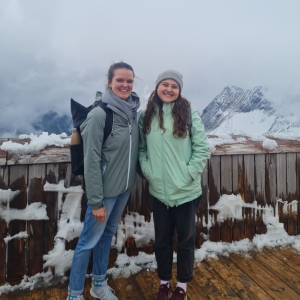
July 2025
From July 9th to 11th, Sedef Ersoy and Alina Umlauf participated in a gender workshop organized by the SFB / TRR 267. The workshop focused on improving communication and presentation skills.
It took place at the Schneefernerhaus on Zugspitze, Germany’s highest mountain. Against this impressive natural backdrop, both participants gained valuable knowledge and practical experience.
Dr. Erika Hilbold Receives Prestigious Simic-Grau Award
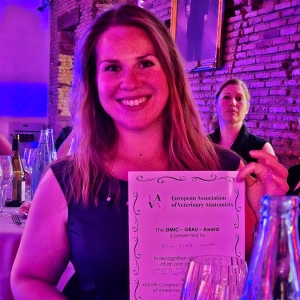
July 2025
We are pleased to announce that Dr. Erika Hilbold, an IMTTS scientist, has been honored with the prestigious Simic-Grau Award at the 35th European Association of Veterinary Anatomists (EAVA) Congress, which took place from July 22 to 25, 2025, in Toulouse, France.
This award recognizes excellence in oral presentations and outstanding scientific contributions to the broad field of comparative veterinary anatomy. Dr. Hilbold received the award for her enthusiastic oral presentation entitled “Investigating long non-coding RNAs in the regenerating mouse heart.” This accomplishment emphasizes the importance of Dr. Hilbold’s research beyond the cardiovascular field, and we congratulate her on this well-deserved recognition.
Fruitful Days of Scientific News and Networking at the 35th EAVA Congress
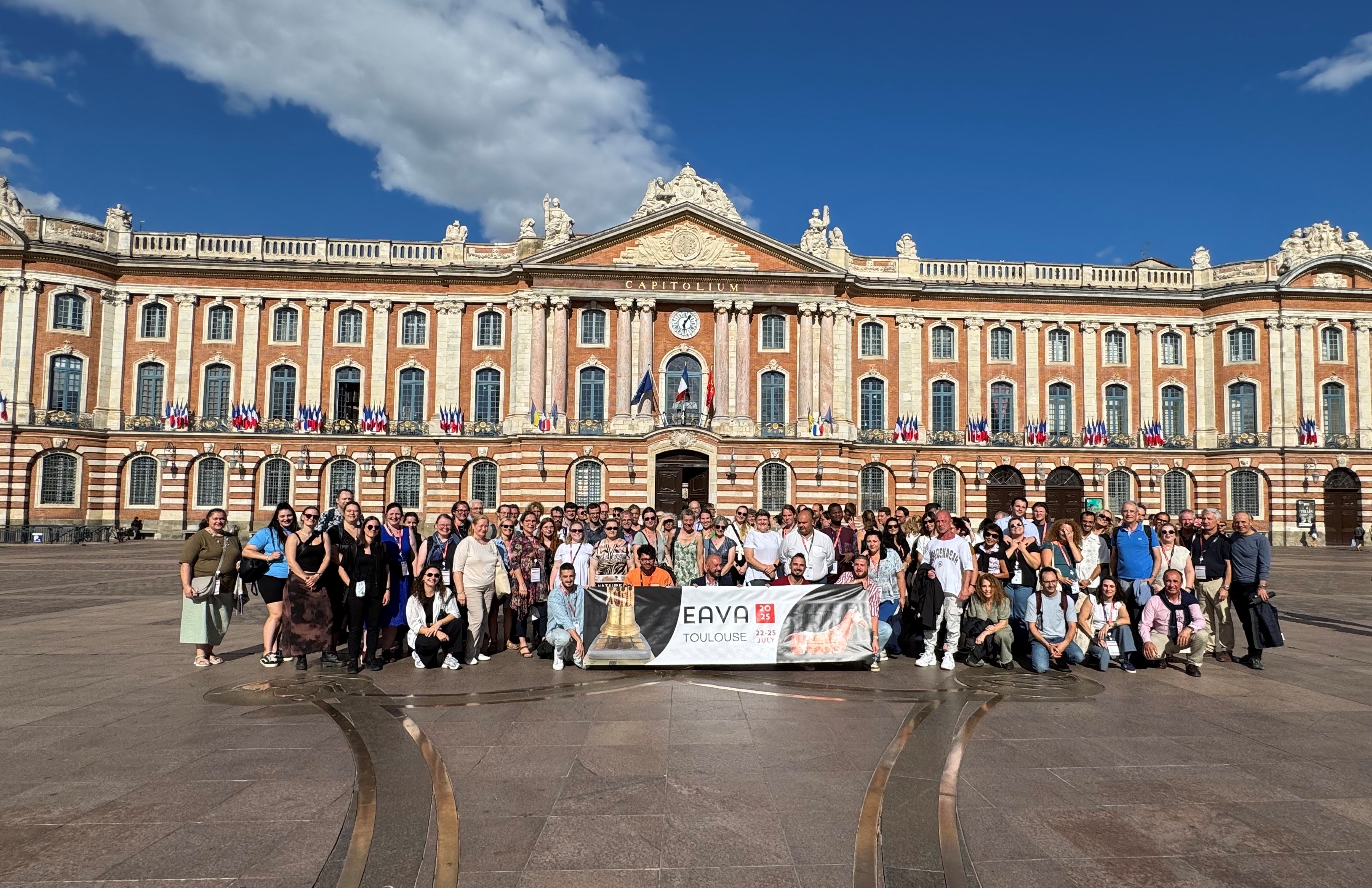
July 2025
IMTTS scientist Dr. Erika Hilbold participated in the 35th EAVA (European Association of Veterinary Anatomists) Congress in Toulouse, France. The congress focused on anatomy in all its aspects - gross, histologic, developmental, and biological - as applied to clinical practice, teaching, and research, with the goal of expanding anatomical knowledge.
EAVA’s diverse membership includes professionals with extensive backgrounds in research, clinical practice, education, and administration from across Europe and the world. Dr. Hilbold had the opportunity to engage with this vibrant community, exchanging insights and discussing the importance of having an extensive knowledge of mouse and human histomorphology in order to conduct successful research.
Generation of a human induced pluripotent stem cell reporter line to investigate cell division and proliferation

July 2025
We have developed a novel human induced pluripotent stem cell (hiPSC) reporter line expressing cyclinB1-eGFP, enabling live tracking of proliferating cells across multiple lineages. This reporter line retains pluripotency and can be efficiently differentiated into cardiomyocytes, endothelial cells, and fibroblasts. The cyclinB1-eGFP system allows real-time identification and sorting of cells in active cell cycle phases (S/G2/M), providing a powerful platform for studying human cell division dynamics. This innovative tool also facilitates screening of pro-proliferative compounds, accelerating research into regenerative therapies and disease mechanisms.
Please find the original article here:
https://doi.org/10.1016/j.scr.2025.103776
Thum Lab Enjoys a Successful Annual Excursion
July 2025
The Thum Lab recently held its annual excursion, marking a successful and enjoyable day for the entire team. While scientific excellence and hard work define our daily efforts, creating a positive and healthy work environment is equally important. This outing provided a valuable opportunity to step away from the lab, strengthen team bonds, and recharge in a relaxed setting. Events like these play a key role in fostering collaboration and maintaining a strong, motivated team.
We sincerely thank Professor Dr. Dr. Thomas Thum for his continued support and for making this great day possible.
EMBO Workshop in Italy: Advancing circRNA Research
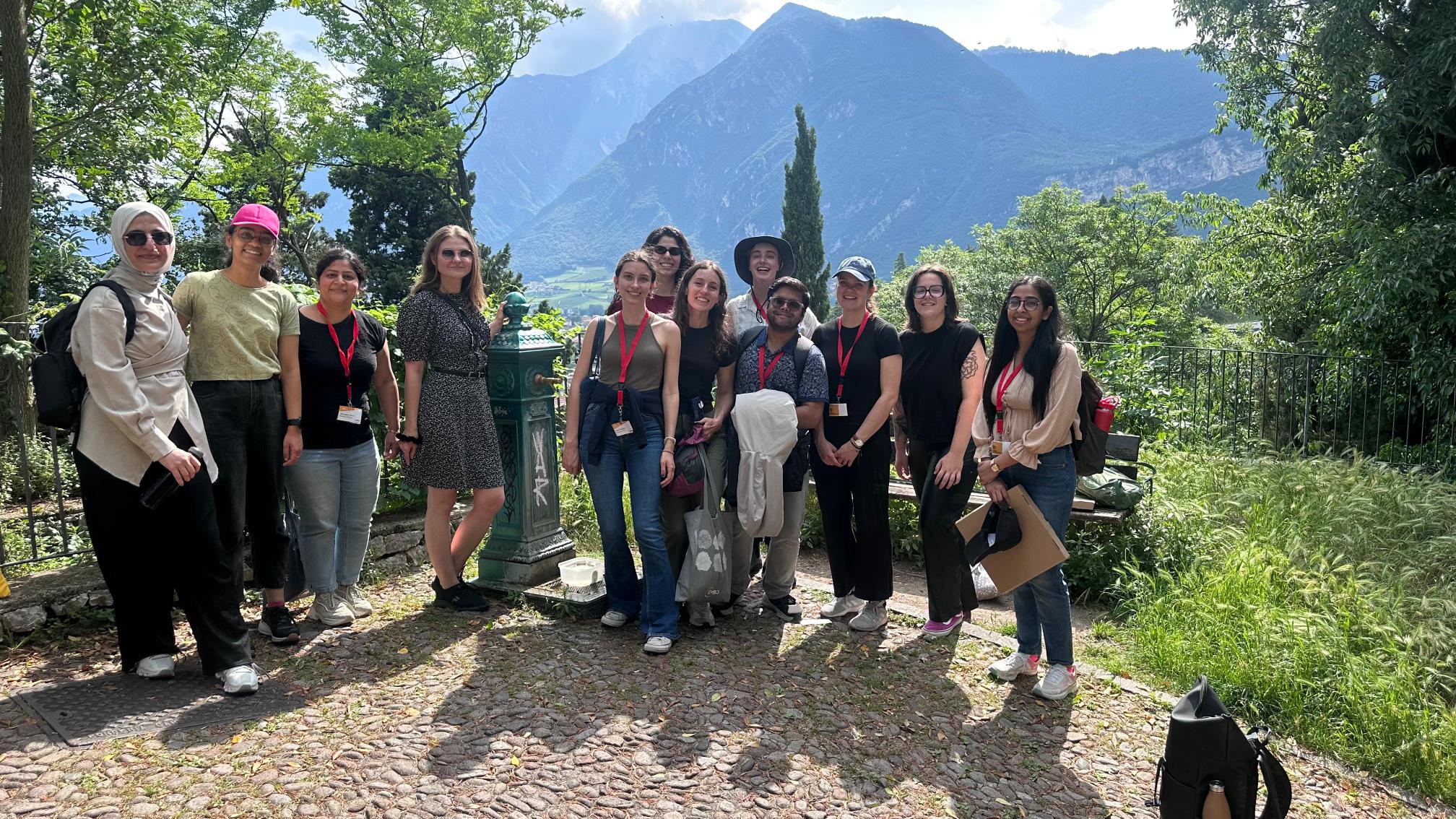
June 2025
Alina Umlauf, a PhD student at IMTTS, had the great opportunity to participate in the EMBO Workshop "gROUNDbreaking Approaches for Advancing circRNA Research: Detection, Function, Therapeutics" held in Trento, Italy, from May 31 to June 6.
Under the guidance of leading experts in the field of circular RNA (circRNA), she gained valuable insights into the latest developments and methodologies in circRNA research. The workshop combined expert talks with hands-on sessions focused on specialized techniques for detecting and studying circRNAs. During the event, Alina also presented her own work and received valuable feedback and new ideas to advance her research. In addition to the scientific program, the workshop provided numerous opportunities for networking and exchange with other participants and researcher.
Congratulations to Marco Bentele on successfully defending his doctoral thesis
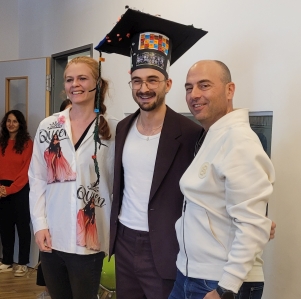
June 2025
Marco Bentele was enrolled in the PhD program “Molecular Medicine” and has successfully defended his doctoral thesis entitled “Investigating cardiac diseases in miniaturized LMS from human cardiac samples”.
Congratulations to Jia Li Ye on the successful defense of her doctoral thesis
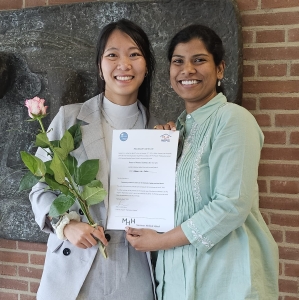
June 2025
Jia Li Ye was enrolled in the PhD program “Regenerative Sciences” and has successfully defended her doctoral thesis entitled “Modulating telomerase activity for the treatment of aging-associated disease”.
IMTTS Researcher Sedef Ersoy Receives CBCS Poster Prize
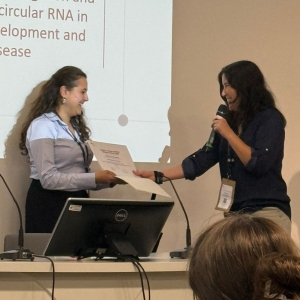
June 2025
Sedef Ersoy, a PhD student at the IMTTS, has been awarded the Poster Prize by the Council on Basic Cardiovascular Science (CBCS) for her presentation entitled “Functional investigation of circular RNA in cardiac development and disease.”
As part of this recognition, Sedef has been invited to attend the “Frontiers in CardioVascular Biomedicine (FCVB) Congress 2026” with complimentary registration.
This achievement highlights the significance of Sedef’s research, and we congratulate her on this well-earned recognition.
CBCS Summer School 2025: A Valuable Experience for Young IMTTS Scientists
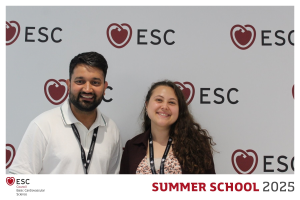
June 2025
Organized by the European Society of Cardiology, the CBCS Summer School in Nice/Sophia Antipolis offers young scientists a unique opportunity to deepen their knowledge in basic cardiovascular science and to build connections with researchers across Europe.
This year, IMTTS PhD students Sedef Ersoy and Shubham Rana were thrilled to participate in the event. They presented their projects in a poster session, engaging with peers and experts to discuss their research.
The four-day program was packed with inspiring talks covering cutting-edge topics in cardiovascular research, providing a stimulating environment for learning and collaboration.
Lea Oehlsen Participated in the World’s Leading Event on Heart Failure
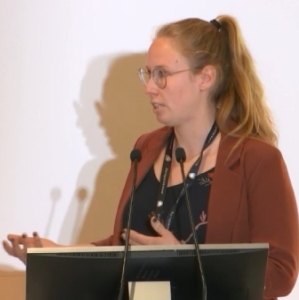
May 2025
In May 2025, Lea Oehlsen, a PhD student at IMTTS, presented her latest research during a rapid-fire session at the World Congress on Acute Heart Failure (HFA 2025) held in Belgrade, Serbia. This prestigious event was organized by the European Society of Cardiology.
Lea’s work was exceptional and was featured in the Highlights of HFA 2025 session on the last day of the conference. This session showcased the program's most outstanding contributions.
We congratulate Lea on her excellent representation of IMTTS and her valuable contribution to the field of acute heart failure research.
Hands-On Training in Ultrasound and Photoacoustic Imaging with Visual Sonics in Amsterdam
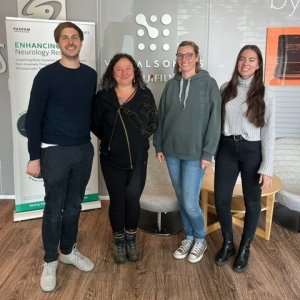
May 2025
IMTTS researchers recently participated in an intensive multimodality workshop organized by Visual Sonics in Amsterdam. The workshop offered hands-on training and expert insights into advanced ultrasound and photoacoustic imaging techniques, empowering researchers to enhance their cardiovascular studies with state-of-the-art technology. This event provided an excellent opportunity to deepen practical skills and foster collaboration within the imaging community.
IMTTS Showcases Groundbreaking Cardiovascular Research at the 91st Annual DGK Conference
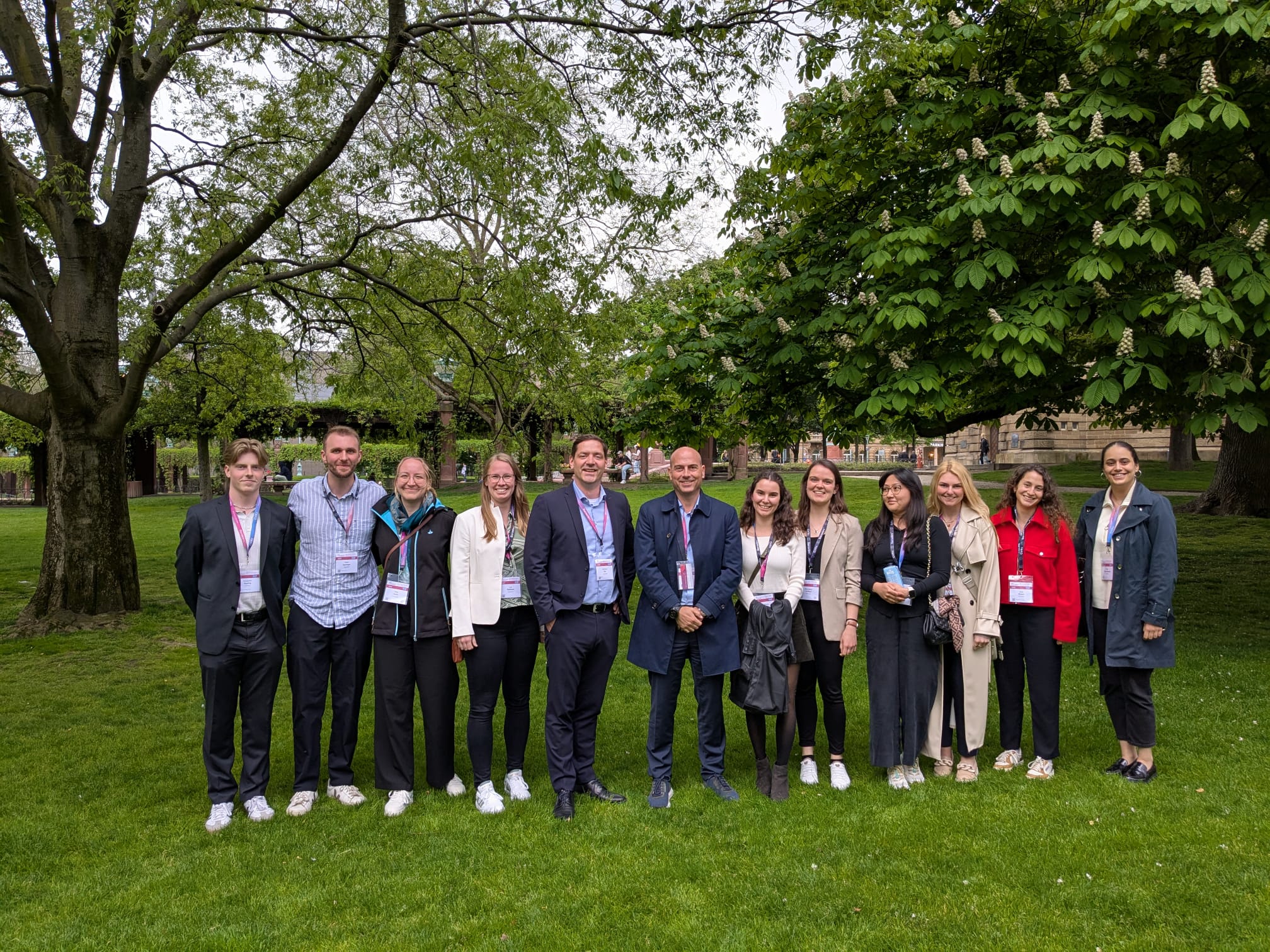
April 2025
The IMTTS was once again well represented at the 91st annual meeting of the German Society of Cardiology (DGK), held in Mannheim from April 23 to 26. The IMTTS presented their work in two poster sessions, “From cells to organism” and “Ageing”, as well as in the Basic Science session, where they gave three talks on “Non-coding RNAs”. Notably, presentations by Prof. Christian Bär and Prof. Thomas Thum covered important topics related to cardiac regeneration and non-coding RNAs as biomarkers and in cardiovascular research.
Additionally, Eric Alberti, Mary Basta Badres, Ayse Boese, Shirin Dildebekova, Constantin Epping, Franziska Herbig, Zeinab Mroue, Lea Oehlsen, and Peter Spenger received travel stipends from the Young DGK Section.
Empowering the Next Generation: Experiences at ESGCT’s Spring School
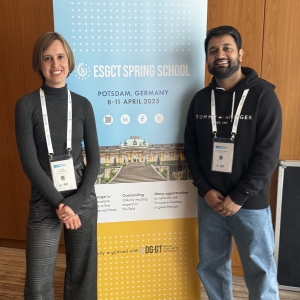
April 2025
The 2025 ESGCT Spring School was held in Potsdam from April 8–11 and was organized by the European Society of Gene and Cell Therapy (ESGCT). The program brought together early-career researchers to expand their knowledge of current gene and cell therapy developments, while promoting collaboration and networking.
IMTTS PhD students Laura Trumann and Shubham Rana participated in the four-day program, which featured lectures, workshops, and interactive discussions. Leading experts contributed to the program by sharing their knowledge during the sessions and engaging with participants at social events, thereby creating a stimulating and supportive learning environment.
Anti-senescence therapies: a new concept to address cardiovascular disease

February 2025
The accumulation of senescent cells contributes to cardiovascular disease through the pro-inflammatory and matrix remodeling molecular program, known as the 'senescence associated secretory phenotype' (SASP), driven by (epi)genetic changes. Emerging therapies such as senolytics, anti-SASP senomorphics, and epigenetic reprogramming aim to target senescence, with some clinical drugs also showing anti-senescence effects. Our comprehensive review provides a guide to understanding senescence biology, systematizes anti-senescence treatments, and proposes a pathway for designing clinical trials to assess their effectiveness.
The publication can be found here: https://academic.oup.com/cardiovascres/advance-article/doi/10.1093/cvr/cvaf030/8046207?login=true
IMTTS scientist Dr. Erika Hilbold receives DGK Research Fellowship
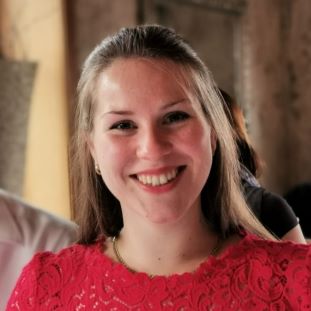
January 2025
The German Society of Cardiology-Cardiovascular Research e.V. (DGK) has awarded Dr. Erika Hilbold with the DGK Research Fellowship. Her research project “Elucidating the functional requirement of long non-coding RNA H19 in neonatal cardiac regeneration” will be funded by the DGK for one year. The project aims to test the potential of H19 as an RNA-based intervention to extend the cardiac regenerative window in newborn mice and to identify involved pathways.
Congratulations to Arne Schmidt for successfully defending his doctoral thesis
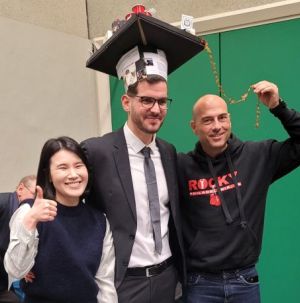
December 2024
Arne Schmidt has successfully defended his doctoral thesis entitled “The role of circular RNAs in cardiac energy metabolism”.
IBT Lower Saxony funds the IMTTS project LuFex with 800,000 €
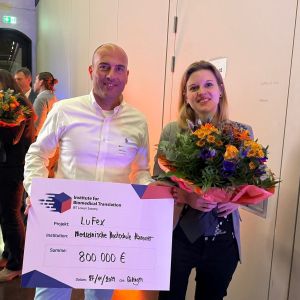
November 2024
Tissue degeneration, including fibrosis, can affect various organs, such as the lungs, and is responsible for around 50% of deaths in industrialized countries. A key event in organ fibrosis is the activation of local fibroblasts, which results in organ stiffness, insufficient oxygen supply, and ultimately organ dysfunction. LuFex aims to develop a new inhaled therapy using a plant-based anti-fibrotic drug, with idiopathic pulmonary fibrosis as the first disease to test this treatment. The project is funded by the Institute for Biomedical Translation (IBT) Lower Saxony in the amount of 800,000 € for a period of two years.
Read more about LuFex here:
https://www.ibt-ls.de/projekte
For the fifth time, Professor Thomas Thum is one of the world's most cited researchers

November 2024
The world's most cited researchers of 2024 have been identified by “Clarivate Analytics”. These scientists have produced multiple highly cited papers ranking in the top 1% of Web of Science™ citations by field and year over the past decade. IMTTS Director Professor Dr. Dr. Thomas Thum is one of these scientists for the fifth time. He is listed this time in the category “Cross-Field”. The current list of Highly Cited Researchers (https://clarivate.com/highly-cited-researchers/) includes 6,886 researchers from 21 disciplines in natural, life and social sciences.
Spooky Season at IMTTS
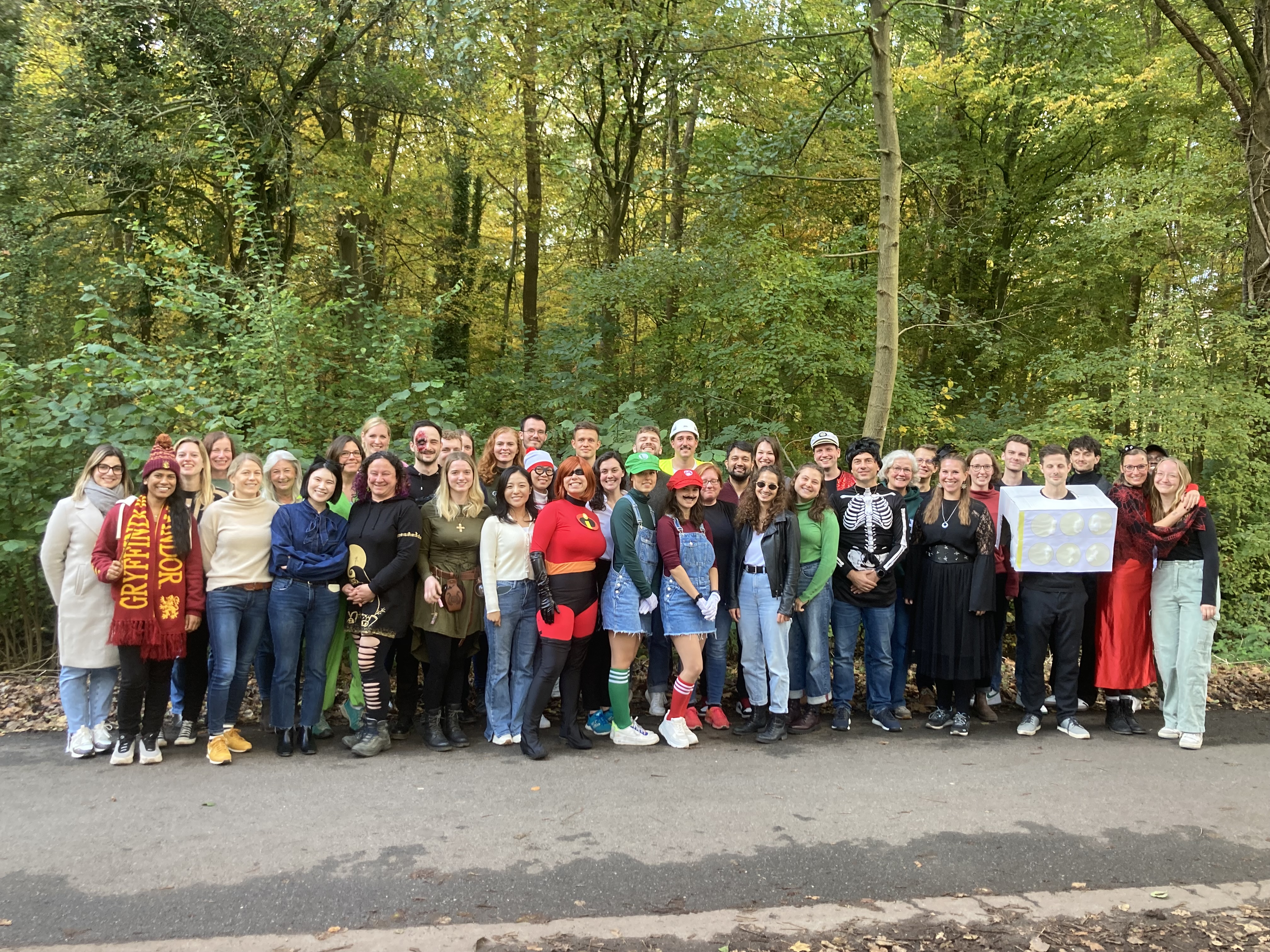
October 2024
Our team is celebrating Halloween with a festive outing full of costumes, fun, and team spirit. It’s a great chance to connect, unwind, and enjoy some seasonal fun together!
Small worm, big breakthrough - Nobel Prize in Medicine 2024 for the discovery of microRNA

October 2024
This year's Nobel Prize in the Physiology or Medicine category goes to two US scientists, Victor Ambros and Gary Ruvkun, for their “groundbreaking discovery” of microRNA and its role in post-transcriptional gene regulation. It all began with a small worm, C. elegans, which despite its small size of around 1mm has various specialized cell types such as muscle cells and neurons and is therefore a popular model organism in basic research. While studying this worm, Ambros and Ruvkun discovered small RNA molecules that are not translated into specific proteins, which was previously the generally accepted function for RNA. The latter is still true today for the so-called “messenger RNA or mRNA”. MicroRNA, on the other hand, plays an important role in gene regulation. It is highly conserved between different species and at least 1000 different microRNAs have now been discovered in humans. MicroRNAs are “fundamentally important” for multicellular organisms, as they control a variety of cellular processes, such as cell growth, cell division and cell differentiation. This makes it possible for cells to specialize into different cell types with a unique composition of proteins despite having the same genetic information. The microRNAs can therefore significantly influence the development and function of the organism. Consequently, abnormal microRNA activity leads to changes in gene regulation and can result in serious diseases such as cancer, diabetes or immune disorders. Rapidly gained knowledge about the functions of microRNAs as well as the good conservation between the different species enabled the development of new therapeutic approaches. On the one hand, a lack of microRNAs can be compensated for by synthetically produced microRNAs. On the other hand, so-called antisense oligonucleotides (ASOs) can be used to block excess microRNAs.
Research into these microRNA functions and the development of new therapeutic strategies for cardiovascular diseases is a major focus of Professor Thum's Institute of Molecular and Translational Therapeutic Strategies (IMTTS) at Hannover Medical School (MHH). Over a decade ago, IMTTS scientists discovered that an excessive presence of microRNA 132 (miR-132) is directly linked to cardiac hypertrophy. Professor Thum's team was subsequently able to show that inhibiting miR-132 can prevent cardiac remodeling and thus preserve cardiac function. In order to further develop this promising candidate as a therapy, the MHH spin-off Cardior Pharmaceuticals GmbH was founded. Cardior has shown in Phase I clinical trials that the first non-coding RNA-based therapy to combat heart failure, the antisense oligonucleotide blocker CDR132L, is safe and well tolerated in patients with heart failure. CDR132L is presently being tested in a phase II clinical trial (HF-REVERT). With 280 patients enrolled, this is currently the largest microRNA study worldwide. The acquisition of Cardior Pharmaceuticals GmbH by Novo Nordisk in May 2024 underlines the importance of basic university research at the MHH and enables “the late-stage development program to be further accelerated through larger approval studies and to move towards market approval,” says Professor Thum.
In summary, Ambros and Ruvkun's discovery paved the way for the development of RNA-based therapies that have great potential for the treatment of cardiovascular diseases and beyond. In particular, the modulation of microRNAs is a key approach in the development of innovative therapies for challenging diseases.
Strengthening Expertise in Stem Cell Research on the Greek Island of Spetses

September 2024
From September 12th to 23rd, 2024, PhD student Ayse Boese attended the 19th European Summer School on Stem Cell Biology and Regenerative Medicine, held on the Greek island of Spetses.
This summer school brings together doctoral students and postdoctoral researchers for an intensive week of lectures and discussions with leading scientists on both the fundamentals and the latest developments in stem cell research.
The event provided valuable opportunities for professional exchange and insight into current research projects from across the field. In addition, Ayse had the opportunity to present her own research and received valuable, constructive feedback. The program’s atmosphere in general fostered open dialogue with the speakers, enabling in-depth discussions and contributing to the establishment of important professional contacts.
Copyright: J. N., Stem Cell Education and Research
Elisa Mohr and Philipp Höhne receive Poster Awards
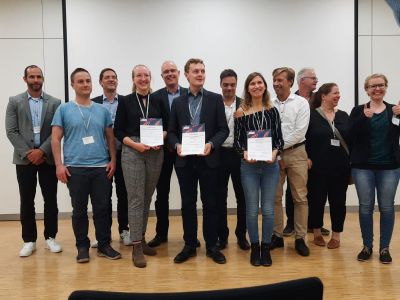
September 2024
The Fraunhofer CIMD Symposium "RNA-Based Therapeutics" took place on September 30 and brought together experts from academia and industry in the field of RNA-based therapeutics.
IMTTS scientists Elisa Mohr and Philipp Höhne received the Poster Award for their excellent poster presentations. Elisa Mohr presented "Cardiovascular diseases in 3D: Human organoids as a multipurpose tool to recapitulate cardiac pathophysiology in vitro". Philipp Höhne gave a presentation on "Superparamagnetic nanoparticles as cardiac-targeted delivery tools for ncRNA therapeutics".
Ex vivo modelling of cardiac injury identifies ferroptosis-related pathways as a potential therapeutic avenue for translational medicine

September 2024
The present study investigated the role of ferroptosis in cardiac injury using rat and human living myocardial slices (LMS) and found that ferroptosis is a key driver of cardiac injury and fibrosis. Pharmacological inhibition of ferroptosis with ferrostatin-1 (Fer-1) improved cardiac function, reduced fibrosis, and enhanced tissue viability in both rat and human heart models. Metallothioneins were identified as potential mediators of ferroptosis inhibition, suggesting that targeting ferroptosis-related pathways may offer a novel therapeutic strategy for heart disease.
Please find the original article here:
https://www.sciencedirect.com/science/article/pii/S0022282824001615?via%3Dihub
A reporter system for live cell tracking of human cardiomyocyte proliferation

August 2024
We have developed a human induced pluripotent stem cell (hiPSC) fluorescent reporter line to track and sort replicating cardiomyocytes, overcoming the limitations of traditional cell proliferation assays. The system allows live-cell labeling of proliferating cells, enabling high-throughput screening of potential pro-regenerative drugs or conditions. This tool provides a novel in vitro platform to advance cardiomyocyte proliferation and cardiac regeneration research.
Please find the original article here:
https://academic.oup.com/cardiovascres/article/120/14/1660/7739742?login=true
Discontinuation of afterload-reducing drugs decreases left ventricular outflow tract obstruction in hypertrophic obstructive cardiomyopathy

July 2024
Hypertrophic cardiomyopathy, the most common genetic heart disease and it is classified into hypertrophic non-obstructive and hypertrophic obstructive cardiomyopathy (HOCM). In this study, we have examined the effects of discontinuing afterload-reducing medications in patients with HOCM. Results showed a significant reduction in the left ventricular outflow tract (LVOT) gradient in patients who stopped these medications, particularly in those with hypertension or heart failure. The findings support discontinuing afterload-reducing drugs and emphasize the use of beta-blockers or non-dihydropyridine-calcium channel blockers as preferred treatments for HOCM.
Read more here: https://www.frontiersin.org/journals/cardiovascular-medicine/articles/10.3389/fcvm.2024.1403422/full
Breathtaking Stem Cell Research and Abstract Merit Award for Dr. Chatterjee

July 2024
The 2024 Annual Meeting of the International Society for Stem Cell Research (ISSCR) was held July 10-13 at the Congress Center in Hamburg, Germany, where stem cell scientists from around the world gathered to discuss exciting discoveries. There were three poster presentations from IMTTS on the topics of stem cell based investigation of cardiac development (Dr. Shambhabi Chatterjee), cardiac proliferation (Prof. Christian Bär) and even a 3D multicellular cardiac model systems for recapitulating cardiovascular diseases in vitro (Ms. Elisa Mohr). Attending the ISSCR2024 was a great networking experience for IMTTS researchers and on top Dr. Chatterjee was also one of the recipients for the ISSCR2024 Abstract Merit Award putting IMTTS research on the forefront. Congratulations to Dr. Chatterjee!
DGK funds a new research project
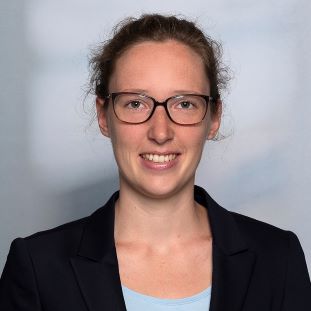
July 2024
IMTTS scientist Dr. Hannah Hunkler received a 49,940 € grant for her research project “Specific degradation of Rho kinases by proximity-inducing drugs as a therapeutic strategy against heart failure in vivo” funded by the DGK for a period of one year. This project aims to test the most potent anti-fibrotic and anti-hypertrophic PROTACs (proteolysis targeting chimeras) in mouse models of heart failure.
DFG grant to study TERT telomere length-metabolism in relation to cardiac damage and regeneration

May 2024
IMTTS’s principal investigator Professor Dr. Christian Bär and Dr. Shambhabi Chatterjee received a 354,898 € grant for the research project “Functional requirement of telomere length and telomerase in the regulation of mitochondrial reactive oxygen species in cardiomyocyte health and disease” funded by the German Research Foundation (Deutsche Forschungsgemeinschaft, DFG) for a period of three years. The project aims to untangle both mechanisms and interactions of the TERT-telomere length-mitochondria axis in cardiovascular stress conditions and gain deeper insights into TERT’s potential to elicit cardiac regenerative responses.
Prestigious Young Investigator Award 2024 for Elisa Mohr

May 2024
Elisa Mohr, a PhD student at the Institute of Molecular and Translational Medicine (IMTTS) at Hannover Medical School, received the Young Investigator Award 2024 at Cardioascona 2024 in Ascona, Switzerland, for her work on "Cardiovascular diseases in 3D: the versatility of cardiac organoids as multipurpose tool to recapitulate the human heart in vitro". Congratulations Elisa!
Please visit https://cardioascona.com/awards
Fascination Cardiomyocytes – Cardioascona 2024
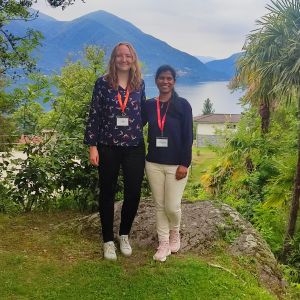
May 2024
IMTTS scientists Dr. Shambhabi Chatterjee and Elisa Mohr had the opportunity to participate in the 11th International Ascona Workshop on Cardiomyocyte Biology in Ascona, Switzerland. During Cardioascona 2024, Richard Harvey, Jennifer Davis, Benjamin Prosser, Lucie Carrier, Roger Foo and many other experts in the field discussed their projects, recent advances and future directions of cardiac research with the participants. Both IMTTS members presented their ongoing projects in lively poster sessions. In summary, a workshop well worth the 11 hours of travel.
New drug against heart failure successfully tested at MHH – SAT.1 TV report

May 2024
At the IMTTS, new therapies are being investigated on an innovative ex vivo system - living human myocardial slices. For the first time, a new drug against heart failure was successfully tested on this living human heart tissue, resulting in a partial regression of fibrosis, which led to more elastic heart tissue and heart muscle cells that were able to relax more during beating, along with an increased viability.
Please watch the report here: https://www.sat1regional.de/neues-medikament-gegen-herzschwaeche-erfolgreich-an-mhh-getestet/
The original publication can be found here: https://academic.oup.com/eurheartj/advance-article/doi/10.1093/eurheartj/ehae102/7619354
Acquisition of IMTTS spinoff Cardior Pharmaceuticals by Novo Nordisk A/S officially completed

May 2024
The transaction for the acquisition of Cardior Pharmaceuticals by Novo Nordisk A/S has been formally completed with the receipt of all regulatory approvals. As of May 2, 2024, Cardior Pharmaceuticals is a wholly owned subsidiary of Novo Nordisk A/S. The transition process is currently under way.
"In Novo Nordisk, we have found an ideal partner with broad clinical and commercial expertise and a growing portfolio of cardiovascular product candidates that will enable us to further accelerate our late-stage development program through larger pivotal trials and toward market approval," said IMTTS Director and Cardior CEO Professor Thum.
The lead compound, CDR123L, is a synthetic antisense oligonucleotide and a selective inhibitor of microRNA‑132‑3p (miR-132). miR-132 expression is associated with pathological cardiac remodeling and heart failure. Basic investigations of mir-132 and the preclinical development of a miR-132 inhibitor for heart failure treatment have been performed at the IMTTS. Thereafter, IMTTS spin-off Cardior Pharmaceuticals took care of CDR123L’s translational development.
In order to further advance CDR123L towards regulatory approval, Novo Nordisk plans to initiate a second Phase 2 trial to evaluate CDR123L in a chronic heart failure population.
Telomerase is essential for cardiac differentiation and sustained metabolism of human cardiomyocytes

April 2024
Linear eukaryotic chromosomes are protected by special nucleoprotein structures known as ‘telomeres’ which are synthesized by the enzyme telomerase. The telomere length is a biomarker for ageing and it is well-known that patients suffering from cardiovascular diseases have shorter telomeres compared to their age-matched healthy subjects. However, it is not clear whether loss of telomeres leads to cardiac dysfunction or whether cardiac damage causes the shortening of telomeres. In order to answer this biological question, IMTTS scientists have generated a sophisticated platform for producing human cardiomyocytes in vitro which possess either long or short telomeres. This was achieved by establishing a CRISPRi TERT human induced pluripotent stem cell (hiPSC) line, which enables modulation of telomerase activity and telomere length at will. Furthermore utilizing the power of hiPSC differentiation protocols, these cells can be differentiated into cardiomyocytes (or any other cell type of choice) in vitro in a dish for functional assays. This research work spearheaded by Dr. Shambhabi Chatterjee under supervision of Prof. Dr. Christian Bär, shows for the first time how the presence of telomerase activity and telomere length is crucial for cardiomyogenesis, contractility and mitochondrial function.
In the next steps, Dr. Chatterjee as part of her DHKT-funded project will apply this platform for telomere-driven disease modelling and drug screening purposes for cardiomyocytes. However, this novel tool is applicable to all other cell types, which can be differentiated from hiPSCs making it an extremely valuable model for telomere and ageing research.
Please find the original article here: https://link.springer.com/article/10.1007/s00018-024-05239-7
Read more here: https://www.mhh.de/en/presse/mhh-insight/news-detailed-view/was-die-schutzkappen-unserer-dna-mit-der-herzgesundheit-zu-tun-haben
Biomarkers 2024

April 2024
Professor Thomas Thum and Professor Christian Bär discussed the latest news on the role of biomarkers and omics in promoting cardiovascular science and care with academic, clinical, and industry leaders in a work group environment at the 19th Annual Meeting of the Transatlantic Heart Failure Biomarker Working Group in Cannes, France, on April 27-28, 2024.
Fruitful presentations, discussions & networking at the Keystone Symposium
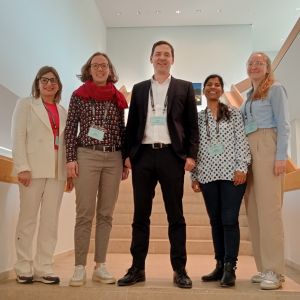
April 2024
The Keystone Symposium on Cardiovascular Epigenetics and Gene Regulation was held at the Herrenhausen Palace in Hannover from April 15 to 18, and several of IMTTS researchers contributed to it. There were five poster presentations and three were selected for short talks as well, encompassing the topics of cardiac development, proliferation, 3D multicellular cardiac model systems and lncRNA-candidates aimed for developing novel therapeutic strategies to treat cardiovascular diseases. The symposium provided the perfect opportunity to make new friends and re-connect with several old ones.
Sweat, ambition and fun - the "ADAC Hannover Marathon Staffellauf 2024"
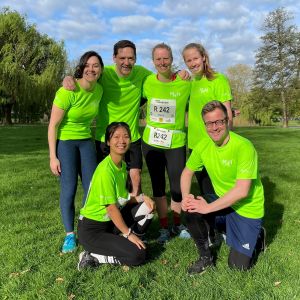
April 2024
For the first time, the IMTTS formed a team to participate in the "ADAC Hannover Marathon Staffellauf" on Sunday, April 14, 2024. In bright sunshine, our motivated IMTTS members enjoyed running the six marathon stages and finished the 42.195 kilometers in under 4 hours. Our team thanks the Hannover Medical School (MHH) for their support.
This year, the MHH was represented by 250 motivated employees from medicine, nursing, research and administration, who joined together in 42 relay teams to complete the "Marathon Staffellauf".
IMTTS researcher Anita-Koula Pralas receives DGK poster prize
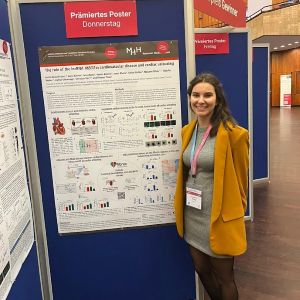
April 2024
Anita-Koula Pralas, a PhD student at the Institute of Molecular and Translational Medicine (IMTTS) at Hannover Medical School, was awarded the prestigious poster prize from the German Cardiac Society (DGK) at the society’s annual conference in Mannheim for her poster entitled “The role of the lncRNA MEG3 in cardiovascular disease and cardiac unloading”, which was selected out of hundreds of posters. This poster delves into the role by which MEG3 influences cardiac fibrosis and is a part of the FIBREX project, funded by the European Innovation Council. Congratulations Anita!!!
Excellent days at the annual meeting of the DGK
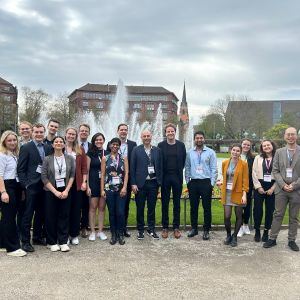
April 2024
This year's 90th Annual Meeting of the German Society of Cardiology (DGK) was held in Mannheim from April 3 to 6, and our group was well represented as usual. With a total of eight posters, out of which we had: 1 poster prize, 1 poster nomination, and 2 posters in the session of the DGK research fellows (DGK - Stipendiaten - Sitzung), we had a lot to celebrate! There were six presentations between Prof. Christian Bär and Prof. Thomas Thum, covering; cardiac regeneration, fibrosis therapy, cardio-oncology, cardio-toxicity, lncRNAs, circRNAs, and of course, celebrating the new advances in the miRNA-132 story that cumulated with the recent purchasing of Cardior Pharmaceuticals by Novo Nordisk last week. These were all exciting and welcoming news to share with other conference attendees to update the field in German cardiology. All in all, a very successful conference!
CAIMed - Lower Saxony Center for AI & Causal Methods in Medicine

March 2024
CAIMed develops innovative methods for improved, personalized healthcare and thus contributes to overcoming widespread diseases such as cancer, cardiovascular diseases and infections. The combination of excellent locations in Lower Saxony for methodological research in artificial intelligence (AI), data-intensive medicine, medical informatics and basic medical research will create a unique beacon for research in AI and personalized medicine.
IMTTS Director Professor Thomas Thum is one of the mentors of the "Semantic Models in Medicine" junior research group, which is part of the "AI & Active Agents" methodological cluster. This junior research group will explore techniques to orchestrate symbolic, causal reasoning and machine learning to improve the interpretability of AI on medical knowledge from relevant literature, ontologies and databases. These semantic models and hybrid AI methods will be used, for example, to predict interactions and discover patterns to identify RNAs in cardiovascular disease and pulmonary fibrosis and to develop RNA-targeted therapies.
Read more about CAIMed here:
- https://caimed.de/en/
- https://www.mhh.de/en/presse/mhh-insight/news-detailed-view/constitutive-supervisory-board-meeting-of-the-lower-saxony-centre-for-ai-and-causal-methods-in-medicine
Living myocardial slices for testing new drugs and innovative heart failure therapies

March 2024
In a recent study, IMTTS scientists demonstrated for the first time that inhibition of microRNA (miR) - 21 has a cardioprotective effect in human heart tissue. As a new method, the study used "living myocardial slices" (LMS). The material was provided by the Clinic for Cardiac, Thoracic, Transplantation and Vascular Surgery at the MHH and is, so to speak, tissue waste from diseased hearts that have been removed as part of a transplant. These myocardial slices continue to live and beat for many days or weeks in a nutrient solution.
The transplants were necessary because the hearts could no longer function properly due to cardiac insufficiency, also known as heart failure. The heart, weakened by a heart attack or high blood pressure, tries to compensate for its reduced pumping capacity by increasing its own volume: The heart gets stronger and stronger, overtaxing itself. This often leads to the proliferation of connective tissue cells (fibroblasts) in the heart muscle, which stiffen the heart and lead to fibrosis. "miR-21 plays a decisive role in this development," says Professor Thum. His team investigated what happens when the harmful function of miR-21 is switched off. They used a so-called antisense molecule, which attaches itself to the microRNA in a mirror image and can thus block it. "We added the blocker to the cultivation chambers in which our LMS from the explanted, fibrosis-damaged hearts were living," explains the cardiologist. The researchers observed a partial regression of fibrosis in the tissue sections. As a result, the tissue became more elastic, the heart muscle cells were able to relax more during beating, and their viability increased.
"To our knowledge, this is the first study to directly investigate the effects of miR-21 in living human heart tissue," says Professor Thum. The LMS model has proven its value in providing preclinical evidence of efficacy and should help to significantly reduce animal testing in the future. "The tests in the cultivation chambers have shown that the miR-21 blocker is a potential drug candidate for stopping and even reversing the development of fibrosis in heart failure.
Since fibrosis can also affect other organs, the antisense molecule could also be considered for the treatment of liver or lung fibrosis. "In addition, heart failure is often associated with concomitant diseases in organs such as the liver and kidneys, so suppressing miR-21 might also be beneficial in cases of impaired liver and kidney function," the scientist assumes. The next step will be to clarify how the blocker can be delivered safely and precisely to the desired target. IMTTS scientists are already working on a solution that should make it possible to deliver RNA therapeutics to different organs in the future.
Please find the original article here: https://academic.oup.com/eurheartj/advance-article/doi/10.1093/eurheartj/ehae102/7619354
Read more here: https://www.mhh.de/en/presse/mhh-insight/news-detailed-view/living-heart-muscle-slices-drive-rna-research-into-heart-failure
R-CUBE, MHH's excellence cluster initiative led by Professor Thum, reaches the final round

February 2024
The draft proposal for "R-CUBE - Organ Regeneration, Repair and Replacement" convinced the German Research Foundation (DFG) and the German Council of Science and Humanities. The MHH Cluster of Excellence Initiative was invited to submit a full proposal from among the draft proposals for new clusters of excellence submitted as part of the Excellence Strategy. R-CUBE is one of 41 draft proposals selected for the final round. Nationwide, 143 draft proposals were submitted. The new Cluster of Excellence will receive up to 10 million euros per year for seven years if the proposal is selected in the final round. The decision on which clusters of excellence will be funded will not be taken until May 2025, and the new seven-year funding period will begin on January 1, 2026.
"The successful performance of R-CUBE in Germany's most important research competition strengthens MHH's position as a leading institution in international transplantation and regeneration research," said MHH President Prof. Dr. Michael Manns. "Despite increasingly fierce competition, we are holding our own in the top group of university medical research institutions - not only in Germany, but also in Europe. I warmly congratulate the team led by Prof. Dr. Dr. Thomas Thum". "The funding would provide us with an exciting opportunity to further advance our vision and make groundbreaking progress in the field of organ repair and replacement," adds Professor Thum.
Current therapies for organ failure are symptomatic, and the shortage of donor organs places an additional burden on patients and their families. R-CUBE is a translational research consortium that aims to strengthen clinical practice and research in advanced organ failure to improve patient care. R-CUBE will develop multimodal diagnostic tools for personalized treatment that will support organ regeneration and repair and provide novel strategies for organ replacement.
Read more here: https://www.mhh.de/en/presse/mhh-insight/news-detailed-view/mhh-may-submit-full-proposal-for-new-cluster-of-excellence
Macrophage-based therapeutic approaches for cardiovascular diseases

January 2024
Cardiovascular diseases (CVDs) remain the leading cause of global mortality despite advancements in drug therapies. Recent research highlights the potential of macrophages, the most abundant immune cells in the heart, as therapeutic targets in CVDs. Macrophages play a critical role in regulating inflammation and fibrosis, key processes in disease progression. However, macrophage-based therapies for CVDs require careful implementation due to their dynamic changes and double-edged phenotypes. To achieve personalized treatment strategies, a thorough understanding of macrophage heterogeneity and plasticity is crucial.
Our review explores the multifaceted roles of macrophages in specific CVDs, including atherosclerosis, myocardial infarction (MI), and heart failure with preserved ejection fraction (HFpEF). We delve into potential macrophage-targeting strategies for each condition, emphasizing novel non-coding RNAs and potential biomarkers. Recognizing the current limitations, we also propose advanced models for studying macrophages in the context of CVDs to bridge the gap between research and clinical application. Ultimately, our review provides a comprehensive understanding of macrophages and paves the way for the development of optimal and clinically relevant macrophage-based therapies for specific CVDs.
The publication can be found here: https://link.springer.com/article/10.1007/s00395-023-01027-9
Prestigious DHKT Research Award 2024 for Dr. Shambhabi Chatterjee
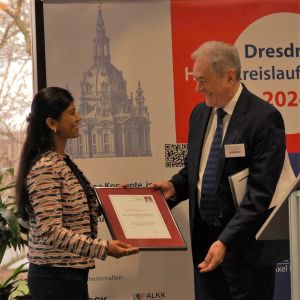
January 2024
IMTTS researchers Dr. Shambhabi Chatterjee and Mrs. Jia Li Ye attended the “Dresdner Herz-Kreislauf-Tage 2024”, 26-28 January 2024 in Dresden, Germany. During this conference Dr. Chatterjee was awarded with the “Forschungspreis 2024” worth 20,000 € for her research proposal entitled “Novel targets to treat hypertrophic cardiomyopathy in cardiomyocytes with short telomeres”. This research prize is awarded to early career scientists with the aim to encourage their research efforts. With this award, the DHKT promotes and recognizes the commitment of scientists in cardiovascular research. In principle, these research awards are intended to support ongoing scientific projects from the entire cardiovascular field from either basic or clinical research and innovation.
MHH again funds the start of two innovative projects

January 2024
IMTTS researchers Dr. Hannah Hunkler and Dr. Natalie Weber, PhD, each received a one-year grant from the MHH's "Hochschulinterne Leistungsförderung (HiLF)" program. The HiLF I program supports early career postdocs with a funding of 25,000 € to generate preliminary data for a successful application for third party funding.
Dr. Hannah Hunkler was awarded funding for her project “Identifikation von potenten PROTACs zur spezifischen Degradierung von Rho Kinasen als Therapie von kardiovaskulären Erkrankungen” and Dr. Natalie Weber, PhD for her HiLF I project “Durch Mavacamten regulierte nicht-kodierende RNAs als neue therapeutische Optionen in Hypertropher Kardiomyopathie“.
Congratulations to Katharina Hempel on the successful defense of her PhD thesis

December 2023
Katharina Hempel has completed her doctoral thesis at the Leibniz University Hannover and at the IMTTS. She has successfully defended her PhD thesis entitled "New concept for the development of a thermal release strategy of active substances for gene therapy".
Congratulations to Marida Sansonetti for successfully defending her PhD thesis
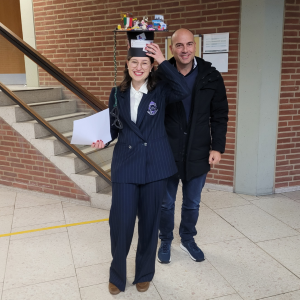
December 2023
Marida Sansonetti has successfully defended her doctoral thesis entitled "Hypoxia-primed macrophages as therapeutic regulators of fibrosis in ischemic heart failure”.
Exciting days of cardiovascular science at the CBFH Biennial Meeting in Naples
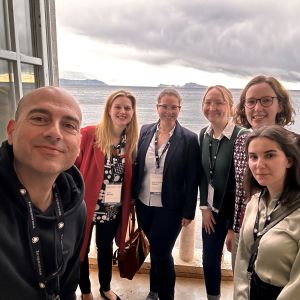
November 2023
The biennial joint meeting of the ESC Working Groups on Cellular Biology of the Heart & Myocardial Function 2023 (CBFH) is a pivotal event in the cardiovascular research field. IMTTS members were thrilled to partake and present their research with oral and poster presentations. Prof. Thomas Thum and Prof. Christian Bär led insightful discussions and delivered exceptional presentations on the impact of the non-coding genome in cardiovascular disease and the importance of telomere biology in heart regeneration. Dr. Anne Bührke, Dr. Erika Hilbold, Dr. Hannah Hunkler, and Elisa Mohr gave excellent poster presentations and were engaged in discussions on the latest findings with experts in the field.
Overall, the meeting presented cutting-edge research, clinical trials, and therapeutic developments and in addition, facilitated connections between the scientific community and biotechnology companies specializing in cardiovascular research.
Professor Thomas Thum is one of the most highly cited researchers in the world for the fourth time in a row

November 2023
"Clarivate Analytics" has released its latest findings on the world's most cited researchers 2023. These scientists have produced multiple highly cited papers that rank in the top 1% by citations for field and year in the Web of Science™ over the past decade.
IMTTS Director Professor Dr. Dr. Thomas Thum is one of those scientists for the fourth consecutive year. This time he is listed in the category "Clinical Medicine". The current list of Highly Cited Researchers (https://clarivate.com/highly-cited-researchers/) includes 7,125 researchers from 23 disciplines in natural, life and social sciences.
Congratulations to Sarah Cushman and Naisam Abbas for successfully defending their PhD theses
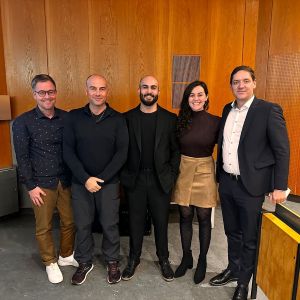
November 2023
IMTTS scientists Sarah Cushman and Naisam Abbas were enrolled in the HBRS PhD program for Molecular Medicine and have both successfully defended their PhD theses this past November. Sarah’s thesis is entitled: "Investigating the role of a species-conserved circular RNA in cardiomyocyte proliferation and regeneration" and Naisam’s thesis was entitled: "Organomimetic living myocardial slices to study novel therapeutic entry routes for translational medicine". Congratulations!
Prof. Dr. Christian Bär, Malte Juchem and Lea Oehlsen attended the 11th mRNA health conference in Berlin
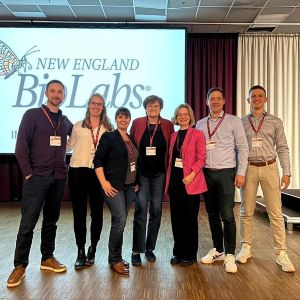
November 2023
Having a shared professorship with the Fraunhofer ITEM, Prof. Bär and his team are part of the lighthouse project RNAuto, which aims at the automated production of mRNA therapeutics. Within the cooperation of different Fraunhofer Institutes there is also a platform for the development of new RNA therapeutics (CIMD RNA Therapeutics). Therefore, the conference was a great inspiration and opportunity to explore the new highlights in the field of RNA therapeutics and their delivery. The conference was filled with excellent talks and the opportunities to meet with several leading researchers as well as industry business partners. During the conference, they had the great honor to meet the Nobel Laureate Katalin Kariko, who won the Nobel Prize in Physiology or Medicine this year for the discoveries concerning nucleoside base modifications that enabled the development of effective mRNA vaccines against COVID-19.
Participation in the 30th European Society of Gene & Cell Therapy (ESGCT) 2023
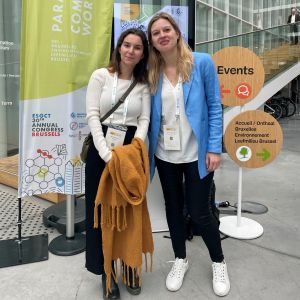
October 2023
IMTTS scientists Dr. Anne Bührke and Anita Pralas proudly represented our FIBREX Team at the ESGCT in Brussels. As the ESGCT is a leading organization in the field of gene and cell therapy, we were excited to join this prestigious event and contribute to the exchange of knowledge and advancements in this rapidly evolving field. The conference brought together experts from various fields of study and demonstrated the translation of innovative research into clinical applications. It included many inspiring talks and panel discussions, which led to an overall fascinating experience. Especially during the Symposium from the European Innovation Council (EIC) Cell and Gene Therapy community, we gained a lot of new insights and perspectives.
Congratulations to Dr. Erika Hilbold for successfully completing the TRAIN Academy's “Translational Research & Medicine” education program
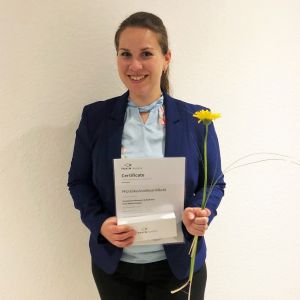
October 2023
For the past two years, IMTTS scientist Dr. Erika Hilbold has been trained in translational health research at the TRAIN Academy (Translational Alliance in Lower Saxony). The two-year career-oriented education program "Translational Research & Medicine: From Idea to Product" covered the individual steps of translational development, including product idea and quality assurance, the different product groups such as small molecules and biologics, and product development from pre-clinic to clinic and market. In addition, methodological and personal skills were promoted.
Cardiology news at the DGK Herztage 2023
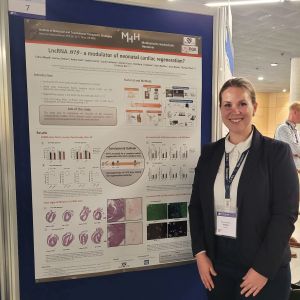
October 2023
IMTTS scientist Dr. Erika Hilbold and clinical researcher Dr. Anselm Derda attended the autumn meeting of the German Society of Cardiology (DGK) "Herztage 2023" in Bonn. Dr. Hilbold presented her work on long non-coding RNAs in neonatal cardiac regeneration at the Basic Science Meeting.
Dr. Derda gave two lectures with tips and tricks for the young/future generation of cardiologists. Both enjoyed the news from the research field and the clinics.
The participation of Dr. Erika Hilbold was supported by a travel grant from the DGK.
Best Poster Award goes to Kevin Schmidt

September 2023
IMTTS researcher Kevin Schmidt attended the D-A-CH Heart Failure Meeting in Göttingen. He received the best poster award in the basic research category for his work on cardioprotective effects of SGLT2 inhibitors in endothelial cells and cardiac fibroblasts.
Exciting days at the 50th European Muscle Conference in Florence
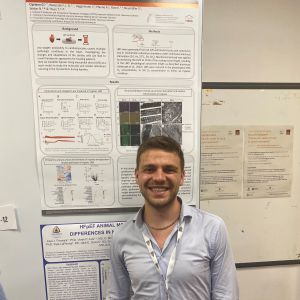
September 2023
Dr. Natalie Weber, PhD and Giuseppe Cipriano, a PhD student, attended the 50th European Muscle Conference (EMC) in Florence with two poster presentations. The EMC is an annual conference that brings together young scientists and senior experts to share the latest advances in muscle research, with topics ranging from basic research on muscle function to new disease models and drug development. This was a wonderful opportunity to learn and grow with experts and fellow scientists.
“Joining forces to protect the heart” – the ESC congress 2023 in Amsterdam
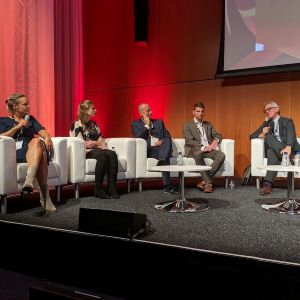
August 2023
Over 24,000 people were in attendance onsite for this year’s European Society of Cardiology (ESC) Conference in Amsterdam. We saw excellent basic science talks about RNA therapeutics for cardiovascular diseases where Professor Dr. Dr. Thomas Thum gave a riveting update on the progress of the first microRNA therapy for heart failure in patients to a completely packed lecture hall.
Works outing
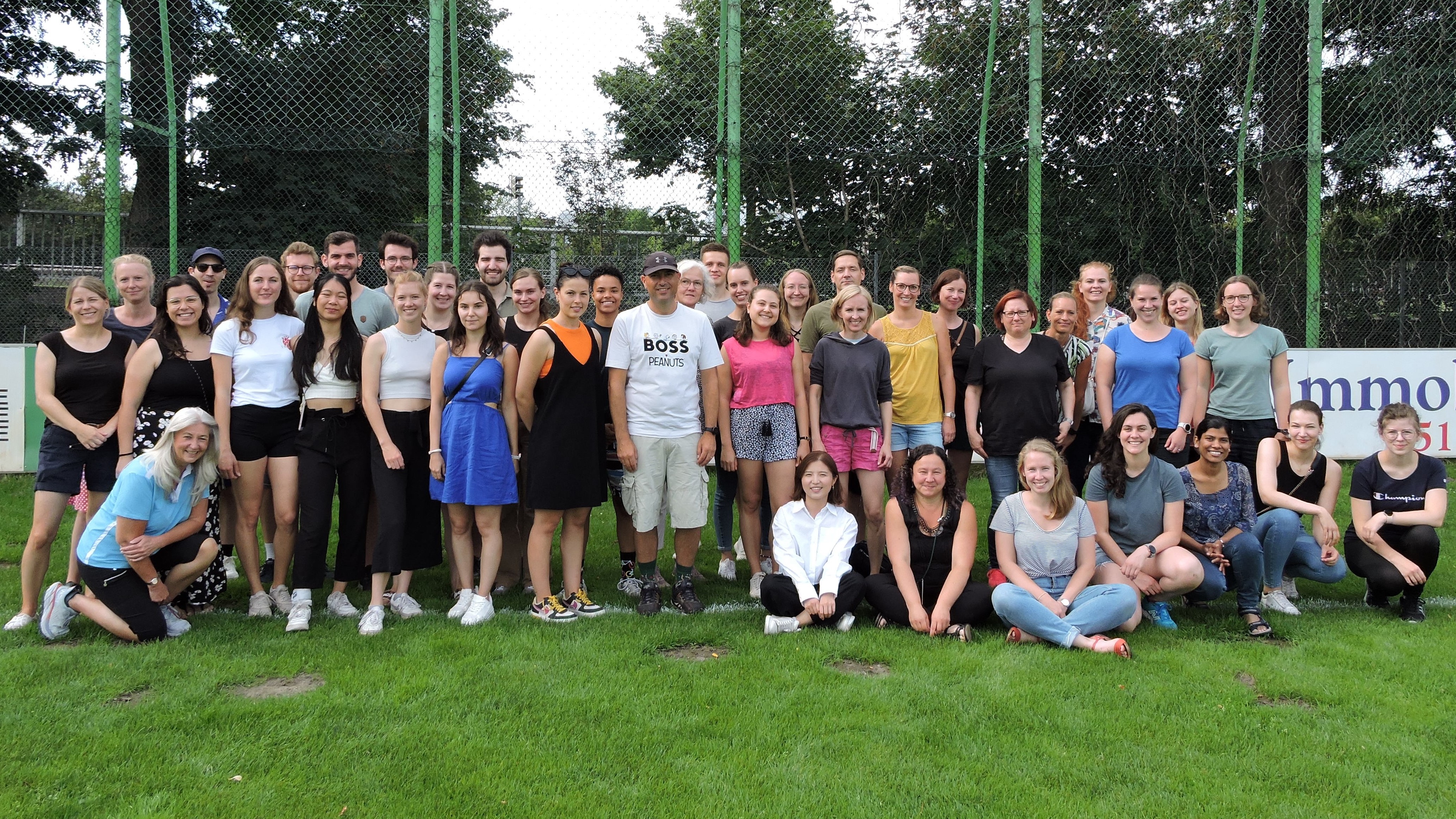
August 2023
The Thum Lab had a very successful annual excursion. In addition to hard work and excellent science, creating a positive and healthy work environment is essential for maintaining a productive atmosphere. We would like to thank Professor Dr. Dr. Thomas Thum for making this day possible.
New White Paper on Recommended Approaches for Nonclinical Pharmacokinetic Characterization of Therapeutic Oligonucleotides

August 2023
The Absorption, Distribution, Metabolism, and Elimination (ADME) Subcommittee of the Oligonucleotide Safety Working Group has published recommendations for ADME characterization of oligonucleotide therapeutics in nonclinical studies.
These recommendations can serve as a starting point for the design of nonclinical studies and as a basis for discussions with regulatory authorities.
The publication can be found here: https://www.liebertpub.com/doi/10.1089/nat.2023.0011
Ellen Schmidt Program Supports Habilitation of Dr. Natalie Weber, PhD
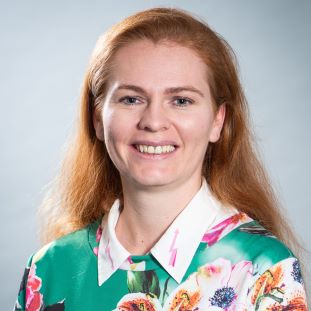
August 2023
We are pleased to announce that IMTTS scientist Dr. med. Natalie Weber, PhD, has been awarded a place in the Ellen Schmidt Program. This is a personnel support program that enables female scientists of all disciplines employed at the MHH to complete their habilitation by releasing them from routine activities.
“Telomerase, eine Herzenssache!”

July 2023
Professor Dr. Christian Bär gave his inaugural lecture at the Hannover Medical School on July 28th and highlighted his outstanding findings on the role of telomerase in cardiomyocytes. We look forward to the coming years in telomerase research.
NextGENERATION Medical Scientist Program

July 2023
IMTTS scientist Dr. med. Natalie Weber, PhD, has been accepted for one of six postdoctoral positions in the "Else Kröner Fresenius Stiftung" (EKFS) Medical Scientist Program nextGENERATION (ReGENERAte Organ FunctION), which offers advanced training in basic biomedical research with a clinically oriented, patient-centered focus. This 3-year structured scientific (and clinical) continuing education will allow her at least 20% research time for her own research project “Stammzell-basierte regenerative Therapien kardialer Erkrankungen” and 120,000 € in funding.
Congratulations to Christopher Jahn for successfully defending his PhD thesis
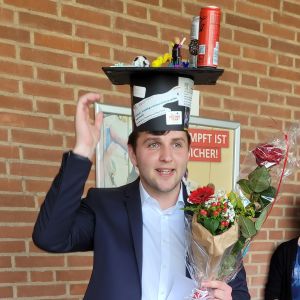
June 2023
IMTTS researcher Christopher Jahn was enrolled in the PhD-program “Molecular Medicine” and has successfully defended his PhD thesis “Investigation of the cellular Fabry disease phenotype using human iPSC-derived cardiomyocytes”.
Best Poster prize at the Euromit 2023 for Dr. Shambhabi Chatterjee
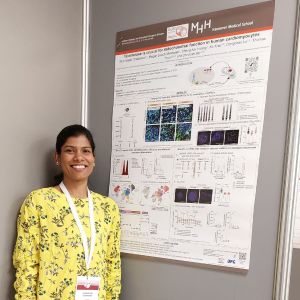
June 2023
Dr. Shambhabi Chatterjee attended the Euromit 2023 - International Meeting on Mitochondrial Pathology, 11-15 June 2023 in Bologna, Italy, where she presented a poster entitled "Telomerase is crucial for mitochondrial function in human cardiomyocytes" and was awarded the Best Poster prize (out of 564 abstracts) worth 550€. Her abstract was also selected for a flash talk presentation at the Young Investigators Meeting on 10 June 2023, co-organized by Mitocon & Euromit 2023.
IMTTS was again well represented at the DGK’s annual conference
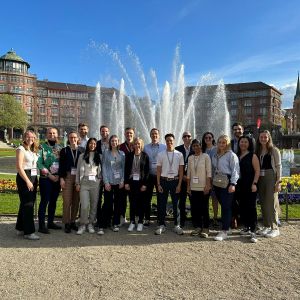
April 2023
IMTTS scientists presented their work in 16 posters and talks at the annual meeting of the Deutsche Gesellschaft für Kardiologie – Herz- und Kreislaufforschung e.V. (DGK). Anita Pralas' poster was nominated for the DGK poster award.
IMTTS researchers Sarah Cushman and Elisa Mohr were supported by travel grants from the DGK. Carla Borisch, Jonas Gruber, Kai Hillebrand and Laura Trumann received travel stipends from the Young DGK Section.
CBCS Summer School in Nice
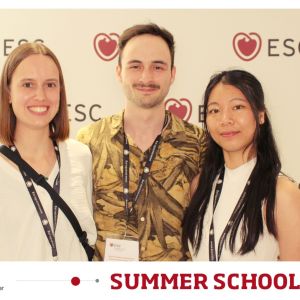
June 2023
Organized by the European Society of Cardiology, the CBCS Summer School in Nice/Sophia Antipolis is a great opportunity for young scientists to gain in-depth knowledge in the field of basic cardiovascular science and to foster relationships between researchers across Europe. This year, Marco Bentele, Jia Li Ye and Laura Trumann had the amazing opportunity to participate in this event and to present and discuss their projects in a poster format with peers and experts. Jia Li Ye also had the honor to present her poster in an oral presentation. The five days were filled with impressive talks on targeted reprogramming of fibroblasts into cardiomyocytes, remote ischemic preconditioning, exosomes and many more cutting-edge topics in cardiovascular research.
Collaborative Research Center on Heart Research (TRR267) extended for 4 years

May 2023
For the past four years, IMTTS researchers and scientists from the Technical University of Munich (TUM), Goethe University Frankfurt, Ludwig-Maximilians-University Munich, Georg-Speyer-Haus Frankfurt, the Max Planck Institute for Heart and Lung Research in Bad Nauheim and Helmholtz Munich have been investigating the role of non-coding RNA in cardiovascular diseases as part of the German Research Foundation (DFG) Transregional Collaborative Research Center "Non-coding RNA in the Cardiovascular System" (TRR267).
The DFG has now announced that the government funding has been extended for another four years. The additional funding will allow us to further investigate the identified target structures and establish this new class of compounds for cardiovascular therapeutics. We are looking forward to a challenging and interesting four years in non-coding RNA research.
For more information, please click here: https://cardiovascular-ncrna.de/
1st place Young Investigator Award at the HFA Congress for Dr. Sonja Groß

May 2023
We are pleased to announce that Dr. Sonja Groß presented her groundbreaking work on AAV capsid engineering for cardiac fibroblast targeting in the Basic Science Young Investigator Award (YIA) Session at the Heart Failure World Congress 2023 in Prague. Her fantastic presentation was awarded with the 1st place Young Investigator Award in Basic Science, which is endowed with 1,000€.
Non-coding genome advanced training

May 2023
Professor Christian Bär spoke about the importance of translational RNA therapeutics in the heart between academia and industry at the international non-coding genome training program at the Institut Currie in Paris. An excellent training for PhD and Master students across Europe.
Professor Dr. Christian Bär a nucleus member of AG13 and AG31

April 2023
Professor Dr. Christian Bär was elected as a nucleus member of the "Myocardial Function and Energetics (AG 13) - Basic Science Cluster" and "Cardiovascular Regeneration (AG 31) - Basic Science Cluster" working groups of the German Cardiac Society.
Prestigious Guido Tarone Award for Dr. Sonja Groß
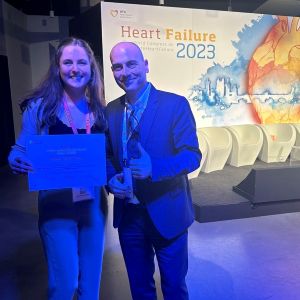
March 2023
IMTTS members Prof. Dr. Dr. Thomas Thum, Prof. Dr. Christian Bär, Dr. Anne Bührke, Sarah Cushman, Naisam Abbas and Dr. Sonja Groß attended the Heart Failure Association (HFA) Winter Meeting on Translational Heart Failure Research in Les Diablerets, Switzerland. They engaged in insightful discussions about the latest advances in heart failure research.
For her outstanding presentation on "Engineered adeno-associated viral vectors with an improved in vivo targeting of cardiac fibroblasts" in the keynote session, Dr. Sonja Groß received the Guido Tarone Award endowed with 1,500€.
IMTTS researcher Kevin Schmidt receives poster prize
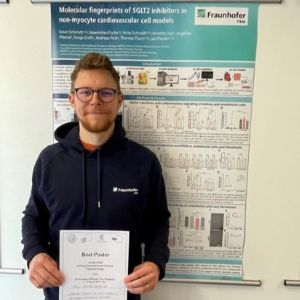
March 2023
We are pleased to announce that Kevin Schmidt, a PhD student at IMTTS, received an award for his poster entitled "Molecular fingerprints of SGLT2 inhibitors in non-myocyte cardiovascular cell model" in the field of experimental and clinical pharmacology at the 8th German Pharm-Tox Summit in Ulm.
HBRS prize for the best presentation goes to Carla Borisch
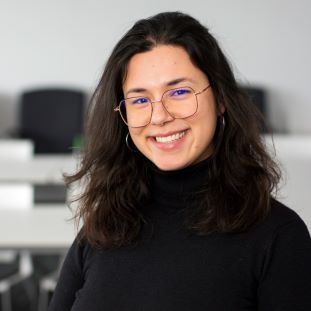
March 2023
For her presentation entitled “Fabry disease modelling using patient-derived iPSCs and multicellular 3D heart organoids”, IMTTS researcher Carla Borisch won the prize for the best oral project presentation of the 1st year “Molecular Medicine” Ph.D. students during the annual retreat of the Hannover Biomedical Research School (HBRS). This accomplishment highlights the importance of her research, which centers on the establishment of a sophisticated in vitro model recapitulating the complex architecture of the human heart and allowing studying the cardiac phenotype of a rare disease such as Fabry disease.
COVID-19, cardiovascular disease and physical activity - what do we know?

March 2023
The COVID-19 pandemic has affected cardiovascular disease and physical activity in different ways. Cardiovascular complications are common in critically ill patients, but also occur in mild and asymptomatic COVID-19 cases. Long COVID has become a major public health concern, in part because of the high burden of cardiovascular symptoms. In addition, adequate levels of regular physical activity are critical for cardiovascular health, healthy body weight, and good mental health, and regular physical activity reduces the risk of severe COVID-19 outcomes. In this review, we provide an overview of the current status as well as future challenges and possible solutions.
Find the publication here: https://pubmed.ncbi.nlm.nih.gov/36868374/
Please also see our video summary: https://www.sciencedirect.com/science/article/pii/S2095254623000194?via%3Dihub#sec0012
News about epigenetic therapies against cardiac fibrosis and remodeling in heart failure

February 2023
In this review, the current knowledge on novel cellular and epigenetic therapies was summarized. Additionally, it was focused on two non-coding RNA-based strategies that reached the phase of early clinical development to counteract cardiac remodeling and heart failure. Moreover, the present status of the development of translating these novel therapies into clinical practice, limitations, and future perspectives were discussed.
Please find the review here: https://pubmed.ncbi.nlm.nih.gov/36004821/
Close interactions between cancer and heart disease

January 2023
Advances in cancer therapies have significantly improved the life expectancy of patients, but have also revealed previously unknown side effects. In particular, severe cardiotoxic side effects of widely used anticancer therapies limit their use and therefore compromise the success of the seemingly most appropriate treatments in large cancer patient cohorts. Conversely, cardiovascular disease can promote both the development and progression of several types of cancer, underscoring the close relationship between the two. These uniquely correlated diseases are being studied in the emerging field of cardio-oncology with increasing interest in non-coding RNAs.
In our review, we focus on the new subtype of non-coding RNAs, circular RNAs, in their distinct exchange within cardio-oncology and discuss their suitability as potent targets for the simultaneous treatment of cardiac dysfunction and cancer.
You can find the publication here: https://pubmed.ncbi.nlm.nih.gov/36651915
Professor Thomas Thum joined JCA as Consulting Editor

January 2023
The Journal of Cardiovascular Aging (JCA) - an international peer-reviewed, open access, online journal – focuses on clinical, translational, and basic science discoveries regarding all aspects of aging and cardiovascular disease.
Professor Thomas Thum joined the Journal as Consulting Editor in January 2023. His research interests are for example transcriptional control in cardiovascular biology by transcription factors and noncoding RNA molecules, development and treatment of heart failure, and diverse aspects in translational cardiovascular medicine, including large animal and early clinical trial studies.
MHH funds the beginning of two innovative projects

January 2023
IMTTS researchers Dr. Shambhabi Chatterjee and Dr. Franziska Kenneweg were each awarded a one-year grant from the Hannover Medical School's (MHH) "Hochschulinterne Leistungsförderung (HiLF)" program.
Dr. Shambhbai Chatterjee received 25,000 € funding for her HiLF I project “Deciphering the metabolic changes underlying the cardioprotection of telomerase therapy in human cardiomyocytes” and Dr. Franziska Kenneweg received 25,000 € funding for her HiLF I project “Entwicklung von herzspezifischen Nanopartikel-basierten Transportvehikeln von ncRNA-Therapeutika“.
The HiLF program supports early career postdocs (HiLF I) with an initial funding allowing the scientist to generate preliminary data for a successful application for external third party funding.
Congratulations to Christian Bär – our new Professor of Cardiac Regeneration

January 2023
Professor Dr. Christian Bär started as principal investigator and group leader at the IMTTS in 2015 investigating cardiac aging and regeneration. In 2021, he habilitated in the field of experimental and regenerative cardiology. Since January 2023, he holds a professorship for Cardiac Regeneration at MHH and Fraunhofer ITEM. This shared professorship enables the unique opportunity to combine basic science with applied research.
Congratulations to Hannah Hunkler for successfully defending her PhD thesis
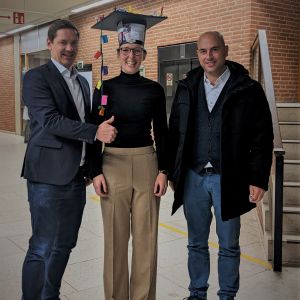
December 2022
IMTTS scientist Hannah Hunkler has successfully defended her PhD thesis entitled “Functional and molecular investigation of the long non-coding RNA Cyrano in cardiac regeneration”.
News about heart failure with preserved ejection fraction (HFpEF)

November 2022
Professor Dr. Dr. Thomas Thum, PD Dr. Christian Bär and Hannah Hunkler contributed to the first SFB1470 retreat in Berlin. They presented new discoveries on the role of circular RNAs in HFpEF.
Please find out more about this interesting topic, here: https://sfb1470.charite.de/
Prof. Thomas Thum is one of the Highly Cited Researchers for the third time

November 2022
The company “Clarivate Analytics” annually analyzes scientific publications and identifies the worlds most cited researchers. These scientists have produced multiple highly cited papers that rank in the top 1% by citations for field and year in the Web of Science™.
IMTTS director Professor Thum is among these researchers for the third successive time. He is listed in the “Cross-Field” category, which means that these researchers have an impact on various science topics, not only within their actual field of work.
The current list of Highly Cited Researchers (https://hcr.clarivate.com/) contains about 6,938 researchers from 23 disciplines in the natural, life and social sciences. Thereof, 369 scientists work in Germany and three – Prof. Dr. Dr. Thomas Thum, Prof. Dr. Michael Manns and Prof. Dr. Thomas Werfel – at the Hannover Medical School.
Dr. Shambhabi Chatterjee receives Young Investigator Award
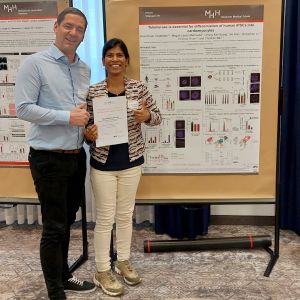
November 2022
IMTTS researchers Naisam Abbas, Dr. Anne Bührke, Dr. Shambhabi Chatterjee, Giuseppe Cipriano and Dr. Mira Jung as well as principle investigators Dr. Natalie Weber, PhD and PD Dr. Christian Bär participated in the second international KFO311-Symposium „Cardiac and pulmonary failure: mechanical unloading and repair“ in Hannover. For her research work, which investigates the role of telomerase during differentiation of induced pluripotent stem cells into cardiomyocyte, Dr. Shambhabi Chatterjee was honored with the Young Investigator Award.
Congratulations to Sonja Groß and Dimyana Neufeldt for successfully defending their PhD theses
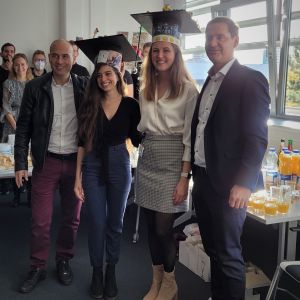
November 2022
IMTTS researcher Sonja Groß has successfully defended her PhD thesis entitled “Generation of cardiac fibroblast-specific AAV vectors for the cell type-specific delivery of non-coding RNAs” within the PhD program “Molecular Medicine”.
Moreover, IMTTS scientist Dimyana Neufeldt was also enrolled in the PhD program “Molecular Medicine” and has successfully defended her PhD thesis “Characterization of circular RNA circZFPM2 as therapeutic target in hypertrophic cardiomyopathy”.
“Classical and Novel Biomarkers and Omics in Cardiovascular Disease – Driving Toward More Medical Value”

October 2022
Professor Thomas Thum and PD Dr. Christian Bär discussed the future of diagnostic, prognostic and risk stratification biomarkers in cardiovascular diseases at the 17th Annual Meeting of the Transatlantic Heart Failure Biomarker Working Group in Cannes, France.
Exciting breakthroughs and innovations in organoids, spheroids and stem cells
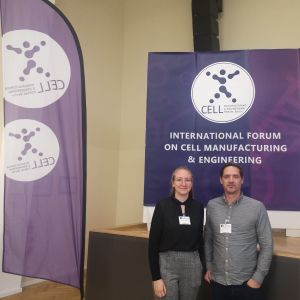
October 2022
PD Dr. Christian Bär and our PhD-student Elisa Mohr attended the International Forum on cell manufacturing and engineering, CellME, in Berlin. Here, scientists, engineers and business delegates were brought together highlighting innovations and exciting breakthroughs in the field of 2D and 3D cell manufacturing technologies, gene- and cell-based therapies. In addition, an exhibition provided the possibility to see the latest technologies in this important field.
RNA leaders USA conference

October 2022
Professor Thomas Thum was presenting how non-coding RNA-based therapeutics can trigger a paradigm shift in treating heart diseases at the RNA Leader’s Conference in Boston. This conference provides latest advances in RNA chemistry and clinical updates from the companies developing new therapies. Thus, Professor Thum enjoyed great discussions and talks in the field of RNA therapeutics.
TRR267 galaxy workshop meeting

October 2022
Sarah Cushman and Dr. Dongchoa Lu met up with SFB partner for an interactive two-day workshop in Frankfurt. They were trained in analyzing RNA-seq and ChIP-seq data.
INNOVATION in cardiac regeneration
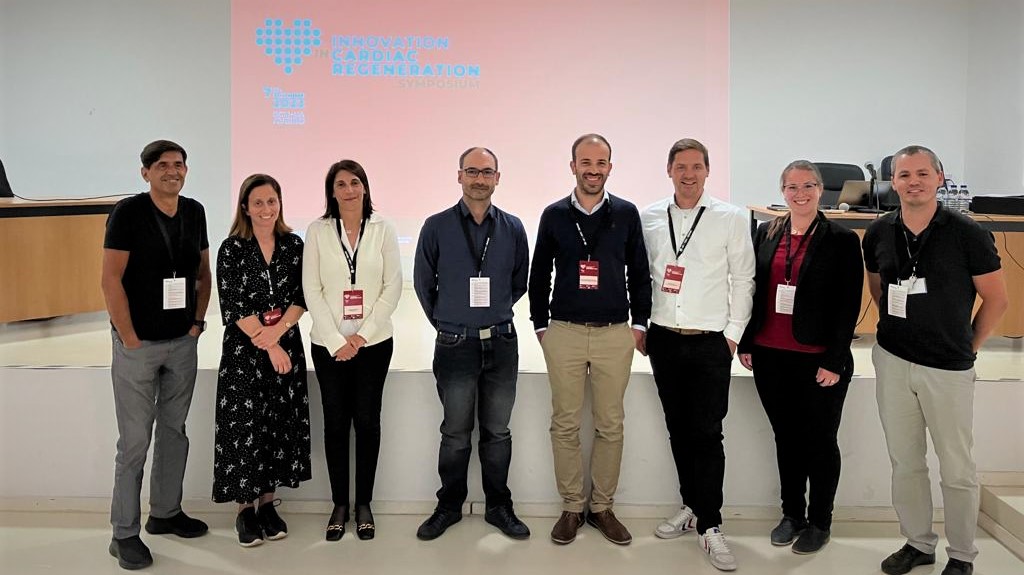
October 2022
PD Dr. Christian Bär and Dr. Erika Hilbold participated in the “INNOVATION in Cardiac Regeneration Symposium” in Aveiro, Portugal. This symposium brought together researchers, students and health professionals to discuss innovative strategies for heart repair using biomedical multi-disciplinary approaches.
Besides, the consortium of INNOVATION - a funded project by the European Research Area Network on Cardiovascular Diseases (ERA-CVD) and coordinated by PD Dr. Christian Bär - met and discussed the newest findings in the world of long non-coding RNAs and cardiac regeneration.
Dr. Dongchao Lu receives prestigious Helmut-Drexler Publication Prize
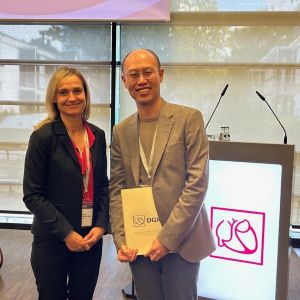
September 2022
The Helmut-Drexler Publication Prize was awarded to IMTTS researcher Dr. Dongchao Lu for his outstanding work entitled „A circular RNA derived from the insulin receptor locus protects against doxorubicin-induced cardiotoxicity“ in the field of myocardial function and energetic at the “Herztage 2022” of the German Cardiac Society (DGK) in Bonn.
The Helmut Drexler Publication Prize aims to promote young scientists in the field of basic cardiovascular research and is endowed with 3000€.
DGK funds two IMTTS research projects

September 2022
IMTTS researcher Dr. Dongchao Lu received a 50,000 € grant for the research project “Recombinant circRNA mediated therapy for cardiotoxicity in cardiomyocytes” funded by the German Society of Cardiology-Cardiovascular Research e.V. (DGK) for a period of one year. The project aims to test the potential of recombinant Circ-INSR as an RNA-based therapy for the prevention of doxorubicin-induced cardiotoxicity.
In addition, IMTTS scientist Dr. med. Natalie Weber, PhD also received a 50,000 € grant for her research project “Non-coding RNA therapies in hypertrophic cardiomyopathy” funded by the DGK for a period of one year. This project aims to identify and modulate non-coding RNAs, which can regulate contractility in cardiomyocytes and myocardial tissue from patients with hypertrophic cardiomyopathy.
ERA-CVD symposium Riga

September 2022
The second ERA-Net on Cardiovascular Diseases (ERA-CVD) Symposium was held in Riga, Lativa. IMTTS’s principal investigator PD Dr. Christian Bär gave insights on lncRNAs regulating cardiac regeneration and had the chance to network globally with innovative scientists.
Excellent days at the German stem cell network (GSCN) annual meeting
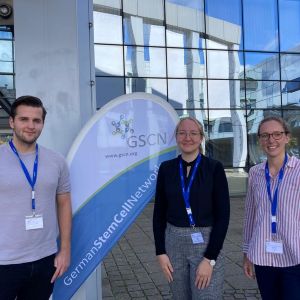
September 2022
Elisa Mohr, Hannah Hunkler and Christopher Jahn had the opportunity to present and discuss their stem-cell based work in a poster format at the GSCN annual meeting 2022 in Münster. Four days were filled with great talks about stem cell biology, cell therapies in diverse diseases, organoid platforms and much more, complemented by industry talks and exhibition. A central highlight was the talk of Nobel Prize winner and stem cell research A-lister Shinya Yamanaka with his inspiring take-home message that you always should dream big, work hard and believe in yourself.
Sonja Groß participated in the first ESGCT Academy

September 2022
This summer, the European Society of Gene & Cell Therapy (ESGCT) launched a new initiative – The ESGCT Academy. PhD-student Sonja Groß had the very exciting chance to both participate and present her work at the ESGCT Academy in San Sebastian, Spain. This was a wonderful opportunity to learn and grow with experts and fellow scientists.
Cardior opens new headquarters

September 2022
In an official ribbon cutting ceremony with Dr. Bernd Althusmann, Deputy Prime Minister of Lower Saxony and Minister of Economic Affairs, Labour, Transportation and Digitization IMTTS spin-off Cardior Pharmaceuticals opened their new headquarters in the science park Marienwerder (Hollerithallee 20, 30419 Hanover).
The Pharma-Oscar goes to Cardior Pharmaceuticals

September 2022
Cardior Pharmaceuticals received the Pharma Trend Image & Innovation Award. Their lead candidate CDR132L has been recognized as “Das Innovativste Produkt® 2022” in the category “Sprunginnovationen”. CDR123L is a synthetic antisense oligonucleotide and a selective inhibitor of microRNA-132-3p (miR-132). miR-132 expression is associated with pathological cardiac remodeling and heart failure. Basic investigations of mir-132 and the preclinical development of a miR-132 inhibitor for heart failure treatment have been performed at the IMTTS. Thereafter, IMTTS spin-off Cardior Pharmaceuticals took care of CDR123L’s translational development and meanwhile the efficacy and safety of CDR132L will be assessed in patients with reduced left ventricular ejection fraction (≤ 45%) after myocardial infarction in a multicenter, randomized, parallel, 3-arm, placebo-controlled phase 2 study (NCT05350969).
Work outing 2022

August 2022
The Thum lab had a very successful annual work outing. In addition to hard work and excellent science, a happy and healthy work environment is essential for productivity! Many thanks to Professor Dr. Dr. Thomas Thum for making this day possible!
IMTTS joined the ESC Congress 2022 in Barcelona

August 2022
IMTTS members spent great days hearing many inspiring talks at the ESC (European Society of Cardiology) Congress in Barcelona. They had nice conversations with key opinion leaders from around the world. Moreover, IMTTS took part in a great session and panel discussion about current and future perspectives of RNA therapeutics.
Professor Thum and IMTTS team received prestigious Desmond Julian Award
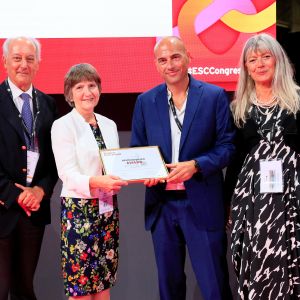
August 2022
Professor Dr. Dr. Thomas Thum and IMTTS team were awarded for their paper “Novel antisense therapy targeting microRNA-132 in patients with heart failure: results of a first-in-human Phase 1b randomized, double-blind, placebo-controlled study” during the Annual Meeting of the European Society of Cardiology.
The Desmond Julian Award is an initiative of the European Heart Journal. This annual prize recognizes one outstanding original paper published in the European Heart Journal during the previous year. Editor-in-Chief and the Executive Editors judge the papers on originality, methodology, presentation, and importance, also utilizing accepted bibliometric indexes. Furthermore, this award also commends the team in which the first author is working.
Please find the original publication here: https://pubmed.ncbi.nlm.nih.gov/33245749/
Further information on the 2022 Desmond Julian Award can be found here: https://doi.org/10.1093/eurheartj/ehac557
“We can still expect a lot there” – an Interview about RNA science and therapies

August 2022
The Federal Agency for Civic Education (Bundeszentrale für politische Bildung/bpb) regularly publishes information on political issues for everyone. "Aus Politik und Zeitgeschichte (APuZ)" is one of the bps‘s magazines, which is published online and as supplement of the newspaper “Das Parlament”.
In the recent issue “Gentechnik”, Professor Thomas Thum gave an interview about RNA, the current RNA research fields and therapeutic possibilities using RNA. With regard to the latter, RNA therapeutics against cancer, rare diseases and heart failure need to be mentioned.
Professor Thum and his team focus on developing RNA therapeutics against heart failure. The first candidate, microRNA-132, has successfully passed the first phase of clinical trials and undergoes the second phase, now. Another candidate, a circular RNA, has been identified, which plays an important role in regulating chemotherapy-mediated cardiotoxicity. Professor Thum believes that “we can still expect a lot” regarding RNA therapeutic strategies.
Please find the whole interview here: "Wir dürfen da noch sehr viel erwarten" | bpb.de
The Thum Lab has officially joined Twitter

August 2022
Updates on our most recent publications, talks, and lab activities in the cardiology and RNA world can be found on Twitter @Thum_Lab, now.
Accelerating cardiovascular research: recent advances in translational 2D and 3D heart models

July 2022
As the prevalence of cardiovascular diseases increases, so does the need for sufficient in vitro systems that recapitulate the complex human heart. Our recent review, first-authored by IMTTS researcher Elisa Mohr and published in the “European Journal of Heart Failure”, therefore summarizes the basic principles of cardiomyocyte monolayer cultivation as well as the 3D culture systems of cardiac spheroids and organoids, engineered cardiac microtissues, bioprinted cardiac tissues and ex vivo living myocardial slices. In addition, we highlighted latest advances of these heart models that aim to bridge the gap of in vitro and in vivo systems.
Please find our review here: https://onlinelibrary.wiley.com/doi/10.1002/ejhf.2631
Nature Review Cardiology highlights IMTTS’ publication
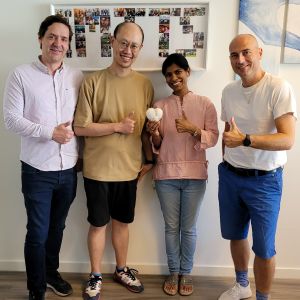
July 2022
We are glad that Nature Review Cardiology selected our recently published article about circular RNAs as novel therapeutic strategy against doxorubicin-induced cardiotoxicity as a research highlight.
Please find their comment here: Circular RNA prevents doxorubicin-induced cardiotoxicity | Nature Reviews Cardiology
Original article: Lu D, Chatterjee S, Xiao K, et al. A circular RNA derived from the insulin receptor locus protects against doxorubicin-induced cardiotoxicity [published online ahead of print, 2022 Jun 27]. Eur Heart J. 2022;ehac337. doi:10.1093/eurheartj/ehac337, see: https://pubmed.ncbi.nlm.nih.gov/35758064/
News about targets in heart failure treatment

July 2022
IMTTS researchers Sonja Groß, Malte Juchem, Jia Li Ye, Kevin Schmidt, Florian Waleczek, Dr. Shambhabi Chatterjee and PD Dr. Christian Bär attended the DGK symposium ‘Targets in heart failure treatment’ in Würzburg organized by AG12 and AG13 of the DGK working groups from 15-16th July 2022. The sessions covered topics in basic, translational and clinical aspects. IMTTS researchers also presented their innovative research during the poster session.
New AAV vectors for cardiac-directed gene therapy

July 2022
AAV vectors are promising delivery tools for human gene therapy. However, broad tissue tropism and pre-existing immunity against natural serotypes limit their clinical use. By in vivo AAV2 peptide display library screening in a murine model of pressure overload-induced cardiac hypertrophy, IMTTS researchers Dr. Laura Rode and PD Dr. Christian Bär have identified two promising AAV capsid variants in collaboration with Prof. Dr. Hildegard Büning.
The newly identified AAV vectors are auspicious novel tools for cardiac-directed gene therapy outcompeting the reference serotype AAV9 regarding the specificity and therapeutic efficiency of in vivo cardiomyocyte transduction.
Please find out more in the original article: https://doi.org/10.1016/j.ymthe.2022.07.003
In addition, please have a look on the website of MHH Insight: https://www.mhh.de/en/presse/mhh-insight/news-detailed-view/targeting-heart-disease#
Circular RNA therapy against doxorubicin-induced cardiotoxicity

June 2022
Noncoding RNA based therapy has gained a lot of focus as a potential treatment strategy for cardiovascular diseases. In another recent publication, IMTTS scientists have identified a highly species conserved circular RNA (Circ-RNA) which plays important role in regulating doxorubicin-mediated cardiotoxicity. Dr. Dongchao Lu and Dr. Shambhabi Chatterjee led this project under the supervision of Prof. Dr. Dr. Thomas Thum and PD Dr. Christian Bär.
After performing a Circ-RNA sequencing, the team came across Circ-INSR as a potential regulator of heart failure. Using animal models in vivo and a translational human induced pluripotent stem cell derived cardiomyocyte (hiPSC-CM) model in vitro, gain and loss-of-function studies for Circ-INSR were performed in the context of doxorubicin-induced heart failure. Using adeno-associated viruses (AAVs), the researchers validated that Circ-INSR overexpression exhibits protective effects against doxorubicin-induced cardiotoxicity via modulating mitochondrial function. Furthermore, these protective effects were reproducible with another novel strategy of Circ-RNA overexpression. The IMTTS research team generated the Circ-INSR mimics with the help of in vitro transcription techniques and applied an innovative circularization technology to produce these molecules for pre-clinical tests.
With this publication, we not only provide a better mechanistic understanding of the Circ-RNA mechanisms but also a novel strategy to overexpress Circ-RNAs for therapeutic options.
Please find the publication here: https://pubmed.ncbi.nlm.nih.gov/35758064/
Congratulations to Anne Bührke and Alessia Costa for successfully defending their PhD theses
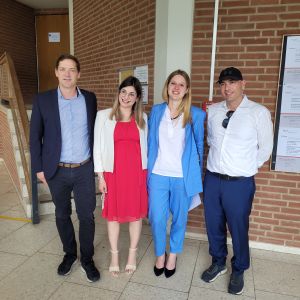
June 2022
IMTTS researcher Anne Bührke has successfully defended her PhD thesis entitled “Long noncoding RNAs H19 and Meg3 as therapeutic targets in cardiac diseases” within the PhD program “Molecular Medicine”.
Moreover, IMTTS scientist Alessia Costa was enrolled in the PhD program “Regenerative Sciences” and has successfully defended her PhD thesis “Establishment of a human reporter cell line for the identification of cardiac regenerative targets”.
New in silico approach for transcription factor regulation screening

June 2022
Analyzing regulatory elements of hypoxia-sensitive genes in silico predicted the transcription factors SP1 and KLF5 as potential orchestrators in human endothelial hypoxic gene expression. Further studies revealed that these transcription factors also modulate angiogenesis by regulating proliferation and tube formation of endothelial cells. In summary, an intuitive in silico approach to screen for transcription factor regulation, allowing the modeling of significant biological processes including, but not limited to, hypoxia has been developed. Such approach is a valuable tool to support RNA-based therapeutic interventions in transition to clinical stage.
The study was led by IMTTS researcher Arne Schmidt in collaboration with Maximilian Fuchs from the Department of Bioinformatics at the University of Würzburg under the supervision of PD Dr. Jan Fiedler, Prof. Dr. Dr. Thomas Thum and Dr. Meik Kunz. Their work entitled “Deciphering Pro-angiogenic Transcription Factor Profiles in Hypoxic Human Endothelial Cells by Combined Bioinformatics and in vitro Modeling” was published in in the journal “Frontiers in Cardiovascular Research”.
Please find the original article here: https://www.frontiersin.org/articles/10.3389/fcvm.2022.877450/full
Berlin was calling
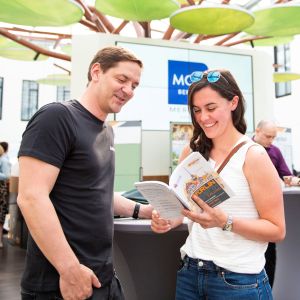
June 2022
The 24th World Congress for the International Society for Heart Research (ISHR) took place this year in Berlin in mid-June. More than 650 participants attended with over 125 lectures, three of which, were given by institute director Prof. Dr. Dr. Thomas Thum entitled:
“CircRNAs as new therapeutic targets in HFpEF”,
“MicroRNAs targeting the SARS-CoV-2 entry receptor ACE2 in cardiomyocytes”, and
“ncRNAs-based therapeutic approaches in HF”.
IMTTS researchers: PD Dr. Christian Bär, Sarah Cushman, and Marida Sansonetti were also in attendance with posters in the following sessions:
“Regeneration, Re-engineering & stem cells” and
“Dysfunction, inflammation and contractile proteins."
DFG grant for investigating senescence in pulmonary and cardiac diseases

May 2022
IMTTS’s principal investigator PD Dr. Christian Bär and Professor Christina Brandenberger (Institute of Functional Anatomy, Charité Berlin) received a 500,000 € grant for the research project “Targeting telomere dysfunction-related immune- and organ senescence in pulmonary and cardiovascular disease” funded by the German Research Foundation (Deutsche Forschungsgemeinschaft, DFG) for a period of three years. The project aims to untangle both mechanisms and interactions of the heart-lung axis in acute lung injury and myocardial infarction as well as to study telomere dysfunction-associated related senescence of the immune system, of heart and lungs. Hence, the ultimate goal of these studies will be to improve age-related regeneration and survival in both diseases.
Neonatal injury models to study heart regeneration

May 2022
Our recent review, published in Basic Research in Cardiology, provides a comprehensive overview of neonatal cardiac injury mouse models, which are widely used for the identification of molecular targets with pro-proliferative potential. These models are essential for understanding and investigating the regenerative potential of mammalian heart. Here we have briefly summarized well-known factors that may stimulate heart regeneration by inducing endogenous cardiomyocyte proliferation in mammals. Further, we highlight the findings emerged in large animal models and in human newborns, which pave the way for promising translational therapies for cardiac regeneration.
Please find the review here: https://link.springer.com/article/10.1007/s00395-022-00931-w
IMTTS Director Professor Thum was awarded a prestigious ERC Advanced Grant by the European Research Council (ERC)

May 2022
Heart failure is one of the most common causes of death worldwide. In Germany, around four million people suffer from cardiac insufficiency. Besides others, remodeling processes in the heart muscle lead to this disease. These processes, inter alia, can be triggered by side effects of chemotherapy.
So far, there is no treatment option that can stop or even reverse the course of the disease. Professor Dr. Dr. Thomas Thum and his team are now looking for such a strategy within the research project REVERSE.
The focus will be on so-called circular RNAs (circRNA), which belong to the group of non-coding RNAs (ncRNA).
"Within the family of ncRNAs, circRNAs are particularly stable and species-conserved, i.e. largely unchanged in the course of evolution," explains Professor Thum. "This makes them ideal targets for drugs."
As first step, a circRNA library will be screened for suitable candidates which will be challenging as, so far, approximately 20,000 to 30,000 different circRNAs have been identified but only for around ten of those their mode of action has been ascertained. Thereafter, IMTTS researchers want to check whether the selected RNA structures actually control the cardiac remodeling in the case of heart damage caused by chemotherapy or other triggers fostering apoptosis in the heart. For this approach, the scientists will use living myocardial slices.
In the following, it will be investigated how cardiotoxicity can be stopped.
Please find more information about this important topic in the entire article: https://www.mhh.de/en/presse/mhh-insight/startseite-news-detailed-view/mhh-researcher-wants-to-stop-harmful-effect-of-chemotherapy-on-heart-muscle
IMTTS receives 2.5 million euros from the European Innovation Council (EIC) to further develop an anti-fibrotic cardiac RNA drug (FIBREX project)

April 2022
Professor Dr. Dr. Thomas Thum and IMTTS researchers discovered a specific long non-coding RNA, which is named Meg3 and is crucial for controlling fibrosis formation in heart failure, in the past.
Within the scope of the FIBREX project, the developed Meg3 inhibitor will be further tested in animal models for efficacy safety in order to reach clinical maturity.
For this phase of drug development, it is usually very difficult to get the necessary financial support. However, the new EU innovation funding line closes this gap, now. Thus, Professor Thum and his team are confident that they will further develop their patented Meg3 inhibitor into an effective fibrosis drug that will drastically revolutionize medical practice, reduce healthcare costs and, last but not least, significantly improve patients' lives.
Please find more information about this important topic in the entire article: https://www.mhh.de/en/presse/mhh-insight/startseite-news-detailed-view/mhh-on-the-home-stretch-to-the-rna-drug-against-cardiac-fibrosis
IMTTS researcher Sarah Cushman receives DGK poster prize
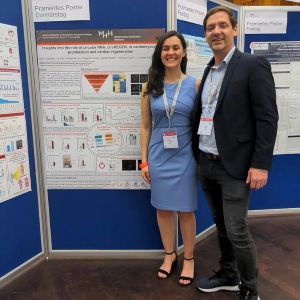
April 2022
Sarah Cushman, a PhD student at IMTTS was awarded the prestigious poster prize from the German Cardiac Society (DGK) at the society’s annual conference in Mannheim for her poster entitled “Insights into the role of circular RNA, circREGEN, in cardiomyocyte proliferation and cardiac regeneration”, which was selected out of hundreds of posters. This poster delves into the role by which circREGEN influences the regenerative potential of the heart, as well as the protective effect it offers against stress inducing factors.
IMTTS is well represented at the DGK’s annual conference
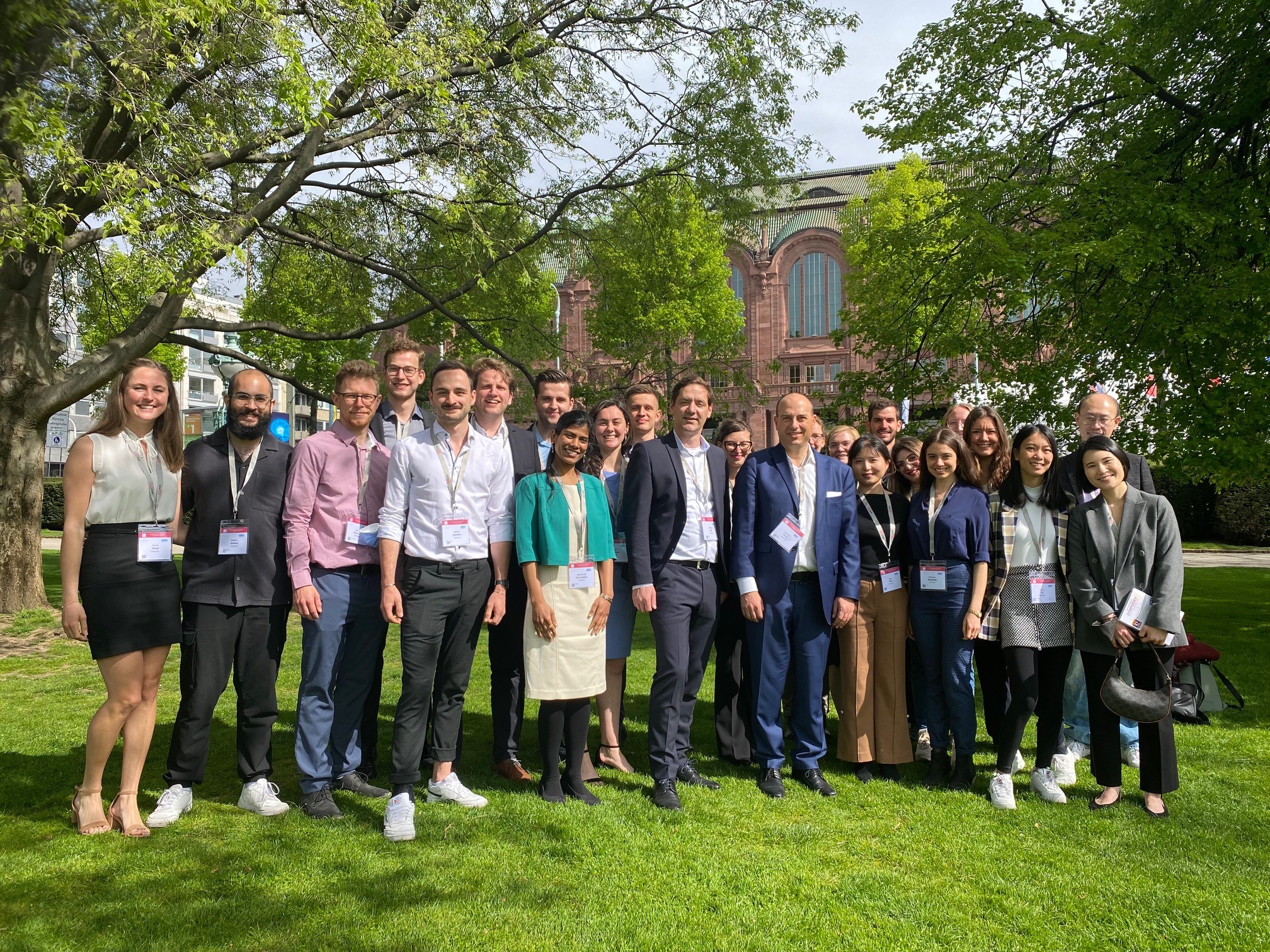
April 2022
IMTTS director Professor Dr. Dr. Thomas Thum and IMTTS researchers Naisam Abbas, Dr. Dongchao Lu, Sonja Groß, Hannah Hunkler, Arne Schmidt, Dr. Mira Jung, Sarah Cushman, Marida Sansonetti, Alessia Costa, Wen Pan, Dr. Christian Bär, Dr. Shambhabi Chatterjee, Dimyana Neufeld, Dr. Anselm Derda, Kevin Schmidt, Christopher Jahn and Jan Weusthoff attended the 88th annual meeting of the DGK (German Society of Cardiology) in Mannheim and presented their work on molecular therapies (ncRNA, small molecules) of heart failure. The attendance of IMTTS researchers Sonja Groß, Hannah Hunkler, Sarah Cushman, Dimyana Neufeld, Kevin Schmidt, Christopher Jahn and Jan Weusthoff was supported by travel grants from the DGK. Naisam Abbas, Marco Bentele, Elisa Mohr, Sinje Biß, Malte Juchem, Lili Ye and Anabel Lambrecht received travel stipends from the Young DGK Section.
The Best Poster Award goes to Dr. Shambhabi Chatterjee at Dutch-German Joint Meeting

March 2022
IMTTS researcher Dr. Shambhabi Chatterjee received the best poster award at the 19th Dutch-German Joint Meeting of the Molecular Cardiology Working Groups including a cash prize of 100€. She had presented her poster entitled “Telomerase is essential for differentiation of human iPSCs into cardiomyocytes”. Dr. Chatterjee’s research highlights the importance of the telomerase enzyme for the development and survival of cardiomyocytes since the absence of telomerase and shorter telomere lengths result in poor differentiation efficiency and higher susceptibility to cell death. This research work also established an elegant in vitro model where telomerase activity and telomere lengths can be modulated at will. Hence, this research work also helped to generate a platform with high potential for drug screening and pre-clinical testing for future research investigations.
IMTTS receives funding of 500,000€ from Lower Saxony for Long COVID studies

March 2022
As around ten to fifteen percent of all SARS-CoV-2 infected people suffer from late effects of COVID‑19, and a mild or asymptomatic infection seemingly does not protect against this, it is of great interest to investigate causes of Long COVID and to develop treatment options. With COFONI (COVID‑19-Forschungsnetzwerk Niedersachsen), the state of Lower Saxony has created a cross-disciplinary research network that aims to combat the long-term consequences of the pandemic.
Within the scope of Lower Saxony‘s COVID-19 research network, the state is providing 5.97 million euros for thirteen interdisciplinary projects. There is special support only for four research projects focusing on Long COVID using special funds, thus, enabling an immediate commencement of the study. One of these research projects will be carried out by IMTTS researchers. The study will investigate the role of circular RNAs as mediators of SARS‑CoV‑2 infections in the cardiovascular system. Initial cell culture experiments have shown that manipulation of certain circular RNAs can potentially inhibit SARS-CoV-2 infection in cardiomyocytes. IMTTS researchers will work together with TWINCORE scientists (Centre for Experimental and Clinical Infection Research) to explore further the therapeutic application of specific circular RNA candidates for COVID-19.
Please find more information on COFONI here: https://www.umg.eu/forschung/corona-forschung/cofoni/
New natural compound similar with anti-fibrotic properties in humans

March 2022
Activated cardiac fibroblasts – the major cell type of human and murine hearts – contribute to an excessive deposition of extracellular matrix (ECM) leading to cardiac fibrosis and subsequently organ dysfunction. Except the pulmonary drugs, nintedanib and pirfenidone, therapeutics specifically targeting anti-fibrotic pathways are rare.
By screening large libraries of natural occurring compounds, first lead structures lycorine and bufaline with anti-fibrotic properties in vitro and in vivo were previously identified. To improve efficacy of these anti-fibrotic lead structures in vitro validation studies and in silico prediction were combined. Additionally, large OMICs-multi-panel-based mechanistic studies were performed.
Twenty-six similars of the initially identified anti-fibrotic lead molecules bufalin and lycorine were analyzed in human cardiac fibroblasts (HCF) and their anti-proliferative activity and potential toxicity were determined in an array of in vitro and ex vivo studies. Noteworthy, certain similars were more effective at inhibiting HCF proliferation than nintedanib and pirfenidone, even at a lower concentration. Furthermore, low cytotoxicity on human iPS-derived cardiomyocytes and anti-fibrotic gene regulation in human ex vivo living myocardial slices were found for selected similars. Moreover, array and RNA sequencing studies of coding and non-coding RNAs in treated HCFs revealed strong anti-fibrotic properties, especially with the lycorine similar lyco-s (also known as homoharringtonine), that led to a nearly complete shutdown of ECM production at concentrations 100-fold lower than the previously identified anti-fibrotic compound lycorine without inducing cellular toxicity.
In summary, a new natural compound similar with strong anti-fibrotic properties in human cardiac fibroblasts and human living heart tissue was identified which potentially opens new anti-fibrotic treatment strategies.
Please find the publication here: https://doi.org/10.1007/s00395-022-00919-6
IMTTS Director Professor Thomas Thum is a new Member of Lower Saxony’s Life Science-Startup-Board

February 2022
The Life Science-Startup-Board of Lower Saxony was founded after the first Life Science Startup Day in 2020. At that time, experts of different fields, such as life science and politics, have recognized the great potential of Lower Saxony’s scientific landscape. By founding the Life Science-Startup-Board they laid the foundation for expanding and strengthening the ecosystem of Life Science-Startups in Lower Saxony. Additionally, they aim to improve its attractiveness.
In particular, the first two work priorities are elaborating potential solutions for more transparency, rapidness and startup friendliness especially with regard to IP based spin-offs and working on the initiative RAPID – Response Against Pandemic Infectious Diseases. The latter will allow a greatly accelerated and early development of new and safe drugs and therapeutics against future pandemic infectious diseases.
For these approaches, an interdisciplinary team is necessary. Thus, the Life Science-Startup-Board 2022 is chaired by Dr. Sabine Johannsen, state secretary of Lower Saxony‘s Ministry of Science and Culture, and Stefan Muhle, state secretary of the Ministry of Economics, Labor, Transport and Digitization of Lower Saxony and furthermore, consists of six scientists and founders. One of those is the director of IMTTS and Fraunhofer ITEM as well as founder of Cardior Pharmaceuticals GmbH Professor Dr. Dr. Thomas Thum.
Please find out more about Lower Saxony’s Life Science-Startup Board here: https://startup.nds.de/expertinnengremium-niedersaechsische-life-science-startup/
MicroRNA therapeutics in cardiac ischemia/reperfusion (I/R) injury

January 2022
RNA therapy is the novel gene therapy for cardiac vascular diseases. IMTTS scientists observed that miR-486 protects against cardiac I/R injury and myocardial apoptosis through targeting PTEN and FoxO1 as well as activation of the AKT/mTOR pathway. Overexpression of miR‑486 might be a promising therapeutic strategy for myocardial protection.
Please find the publication here: https://pubmed.ncbi.nlm.nih.gov/35077859/
Animal models and animal-free innovations for cardiovascular research: current status and routes to be explored.

January 2022
Consensus document of the European Society of Cardiology (ESC) Working Group on Myocardial Function and the ESC Working Group on Cellular Biology of the Heart
Cardiovascular diseases represent a major cause of morbidity and mortality, necessitating research to improve diagnostics, and to discover as well as test novel preventive and curative therapies. All of which warrant experimental models that recapitulate human disease. The translation of basic science results to clinical practice is a challenging task. In particular, for complex conditions such as cardiovascular diseases, which often result from multiple risk factors and co-morbidities. This consensus document highlights recent advances in trying to reduce the number of animals for cardiovascular research. These models range from stem cell-derived models to in situ modelling of heart properties, bioinformatic models based on large datasets, and improved current animal models, which show clinically relevant characteristics observed in patients with a cardiovascular disease. Hereby, the aim is to provide a guide to help researchers in their experimental design to translate bench findings to clinical routine taking the replacement, reduction and refinement (3R) as a guiding concept.
Please find the new position paper by the ESC here: https://doi.org/10.1093/cvr/cvab370
IMTTS is a Collaborator of the DFG Collaborative Research Center 1470

January 2022
The German Research Foundation (DFG) provides initial funding of € 12 million for a period of four years for a new Collaborative Research Center (CRC) led by Charité to study the underlying mechanisms of a specific type of heart failure – known as “heart failure with preserved ejection fraction” (HfpEF) – and to develop targeted treatments.
Hannover Medical School is one of the CRC 1470 collaborators. IMTTS will be responsible for the project “Mechanisms, therapeutics and diagnostic potential of circular RNAs in HfpEF”. Within this project, the researchers will focus on three specific, interconnected work packages. The overall goal of these is to investigate how circular RNAs are mechanistically involved in cardiac remodeling and diastolic dysfunction.
“We have established and published relevant methods for cardiac phenotyping, RNA sequencing and analysis,” says Prof. Dr. Dr. Thomas Thum. Furthermore, he clarifies: “Specifically, we aim (1) to improve our understanding about the function and potential therapeutic modulation using in vitro and ex vivo models of HFpEF, (2) to establish a new cell‑type specific circRNA-based therapeutic approach of HFpEF and (3) to test whether selected circulating noncoding RNAs can serve as stratification markers in various cohorts of patients with HFpEF. The ambition and vision of this project is to develop a next generation therapeutic approach for HFpEF patients within the first funding period of the CRC and beyond.”
Please find more information on the official website: DFG Sonderforschungsbereich 1470 - DFG Collaborative Research Centre 1470 (charite.de)